Chief Anil Grover Leads In Social Impact

Election Season: LBSAA Takes To The Vote
Lagos Business School appoints Deputy Dean






Election Season: LBSAA Takes To The Vote
Lagos Business School appoints Deputy Dean




In our last edition, I had encouraged our network to
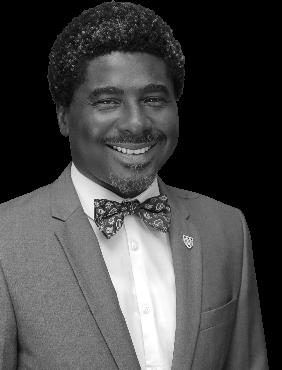
stay strong while holding each other's hand as we went through the “valley” that saw the world shut down activities for months. We knew that on our way out, we would still experience the “shadows”: Recessions, employee lay-offs, bankruptcies and general citizenry unrest. What we did not know and still do not know is how much time it will take for the light to filter through the mist…
However, we must press forward, albeit slowly, but onward. This phase must pass and history will tell the tales of those who trudged on, while holding the torch for those following behind.
In this issue, we focus on alumni who are leading their organisations in social impact, expanding the oasis of sanity in many directions of society. We bring you news from the home front, including the election of the new Vice President and Secretary of our noble Association and the handover of the leadership reins to a new President. We hope you enjoy the Features section, written by our Alumni and the story of love and friendship that began in our corridors of learning. We showcase our Alumni who were mentioned in mainstream news and updates from various Alumni classes. We share activities from different Alumni zones in Alumni Happenings and throw a spotlight on activities created by some classes during this pandemic to keep the class together.
As I stated in the last edition, more than ever, we must reach out to each other and hold on strongly to the bonds formed during our days together at school. Together, with God's help, the valley of shadows will become what it really is…nothing but shadows.

gos Business School (LBS) is the graduate business school of Pan-Atlantic University, owned by the Pan-Atlantic University Foundation (PAUF), a non-profit foundation registered in Nigeria. LBS was founded on inspirations from the teachings of St Josemaria Escrivá, the founder of Opus Dei LBS offers academic programmes, executive programmes and short courses (customised to specific company needs, as well as open-enrolment courses) in management. Its offerings have been accredited globally and ranked among the best in Africa, as it systematically strives to improve the practice of management on the continent The business school's efforts have been recognised by several world-class accreditations and rankings. Besides the quality bar set at world-standards, LBS programmes also stand out b e c a u s e o f t h e e m p h a s i s o n professional ethics and service to the community.
La
Education at LBS is comprehensive, drawing on the experiences of a multinational faculty and participants. Learning is participant-centred and uses the case study method. Activities hold on the school's purpose-built
facilities which serve more than 3,000 participants yearly from indigenous and multinational companies These attest to the expert teaching, the relevance of the programmes and the overall benefits derived from attending.
LBS has a robust alumni association with more than 6,000 members. This asset base, as well as the close relationship with the corporate world, ensures that the programmes offered, as well as having international standards, also has local relevance.
Learning at LBS is based on a Christian conception of the dignity of man, of society and economic activity The Prelature of Opus Dei, an institution of t h e C a t h o l i c C h u r c h , t a k e s responsibility for guaranteeing that this vision underlies all teaching, publishing and research activities of the School.
LBS is a member of the Association of African Business Schools (AABS), the Global Business School Network (GBSN), the Principles for Responsible Management Education (PRME), AACSB International-The Association to Advance Collegiate Schools of B u s i n e s s a n d t h e G r a d u a t e Management Admission Council
(GMAC), alongside 220 leading graduate business schools worldwide. GMAC is an organisation of leading graduate management schools in the world and the owner of the GMAT exam.
In recognition of the quality of Lagos Business School's programmes and of being structured in line with global best practices, it has received several international accreditations. LBS is the first business school in West, East and Central Africa regions to be accredited by The Association of MBAs (AMBA). This puts LBS amongst the exclusive group of only 2% of business schools in 7 0 c o u n t r i e s t o a c h i e v e t h i s accreditation The Association to Advance Collegiate Schools of Business (AACSB) has also accredited LBS, the first institution to be so recognised in all of West Africa. LBS thus joined the league of less than 5% of business schools globally, to be accredited by AACSB in December 2016. This accreditation affirms Lagos Business School's undeniable commitment, over the last 29 years, to world-class standards in teaching, learning, research, academic and professional management.
LBS has been ranked every year since 2007 by the Financial Times of London, among the top global providers of open enrolment executive education and in custom executive education since 2015. The latter ranked number one in Africa on the 2020 Financial Times list. LBS' MBA programmes have held Tier One positions on CEO Magazine's Global MBA rankings for three consecutive years. The School is listed among the top 50 global business schools on The Economist magazine's 2018 Executive MBA ranking.
The aims of the LBS Alumni Association are linked with those of the School. They include:
· To promote continuous education for its members and forge a stronger relationship among them

To support LBS in its aims and objectives
To render service to the society, especially in the area of public and private management
· To adopt such other objectives as may generally be in the interest of the Association and/or Lagos Business School

Members actively receive continuous education through alumni sessions held all year long. There is also the annual alumni conference held in November which features very high-profile speakers Active participation in the sessions affords alumni the opportunity to effectively and continually update their knowledge of general management and business subjects.
In addition, there are a variety of discounts from corporate bodies ranging from international airlines and major hotels within and outside the country to internet service providers, bookshops, laundry services, etc. available to financial members of the LBSAA. They also benefit from discounts on all LBS executive programmes and seminars throughout the year.
The LBS alumni network is one of the most influential among business schools in Africa. Active participation in alumni programmes and constant visits to the alumni networking platform, help h�ps://lbsalumniconnect.com members stay connected with former course mates, faculty and other alumni Alumni also benefit from access to research materials available in the LBS library.
Currently, the LBSAA has a membership of over 6,700. The Association comprises chief executives, owner managers, executive directors, senior and middle-level managers who have successfully completed the School's varying executive programmes, namely: the Chief Executive Programme (CEP), the Owner Manager Programme (OMP), the Advanced Management Programme (AMP), the Senior Management Programme (SMP), the Management Acceleration Programme (MAP), the Agri-Business Management Programme (AgMP) and the various MBA programmes. It also includes full-time faculty of the School.

Lagos Business School (LBS) has become the only business school
in Africa to be featured on The Economist 2020 Executive MBA Ranking.

The Economist's Executive MBA ranking is a bi-annual list of the best providers of the Executive MBA programme across the world categorised based on two broad measures: personal development/educational experience and career development.
The LBS Modular Executive MBA was ranked based on the quality of students, student and faculty diversity, quality of faculty, programme quality, career progression, salary and networking. The programme holds the 2nd position in the world in the category of percentage increase in pre-EMBA salary on graduation, and 4th position in the percentage increase in pre-EMBA salary after one year.
Jen Braswell, Director, Value Creation, CDC Group; Jessica Espinoza, Chair, 2X Challenge & Global Gender Finance Lead, DEG;
Charity Wallace, MD: Global Women's Issues, U.S. DFC; Joanne Yoo, MD, Development Partners International; Megan Blair, Founder, Early Bird;
Linda Mateza, CEO/PO, Eskom Pension & Provident Fund;
Geetha Tharmaratnam, Founding Partner, Aequalitas Capital Partners;
Donna Sims Wilson, COO, Kah Capital Management;
Roselyn Spencer, Founder, Cedar Pension Consulting;
Adesuwa Okunbo Rhodes, Founder, Aruwa Capital;
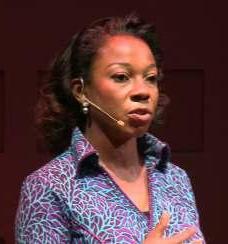
Cathy Goddard-Edwards, CEO, FyreFem Fund Manager;
Faith Khanyile, CEO, WDB Investment Holdings;
Raylene Watson, COO, EBS Advisory;
Vivina Berla, Founder, Vimine Holding; Kanini Mutooni, MD, Draper Richards Kaplan Foundation; Tariye Gbadegesin, MD/CIO, ARM-Harith Infrastructure Fund Managers;
Commenting on the achievement, MBA Director, Dr Uchenna Uzo said, “At Lagos Business School, we have consistently proven that the knowledge we offer on our MBA programmes adequately prepare managers for career progression. This is because we feel the pulse of the market and deliver a curriculum that is adapted to solving our students' distinct challenges.”
Lagos Business School was ranked alongside other top business schools including the IESE Business School, Yale School of Management, and Kellogg School of Management.
This is the second consecutive year the LBS Modular Executive MBA is being ranked by The Economist magazine. In May 2020, Lagos Business School's Custom Executive Education was named first in Africa by the 2020 Financial Times Executive Education ranking.
On Thursday, 1st of October, LBS Faculty of Entrepreneurship, Dr Henrietta Onwuegbuzie was a speaker at the Women-led & Owned Dialogue series with 22 senior c-suite executives from around the world.

The Women-Led & Owned Dialogue aims to catalyse solutions on
issues where women in leadership or with the potential to lead across Africa are disproportionately impacted while unlocking gender-smart capital at scale for women-owned businesses. The programme brought together new perspectives on ways to accelerate and unlock women ' s leadership potential, improving business performance while aligning stakeholders' values.
The webinar split into four sessions had speakers from both the private and public sector, lending their voice to the conversation of the impact of women in society.
The speakers include
Dr Amy Jadesimi, MD, LADOL; Simiso Velempini, CEO, Africa Matters; Ijeoma D. Agboti-Obatoyinbo, MD/CEO, FBNQuest Funds; and
The speakers highlighted the benefits of having women at the decision table; they provided data on how boards with women outperform others in the same industry Also mentioned was the role women play in crisis leadership, with reference to leadership during the current global pandemic.
Speakers referenced the fifth sustainable development goal (SDG 5) which is to achieve gender equality and empower all women and girls and reiterated that without the achievement of SDG 5, the world would not be able to accomplish all other SDGs. One of the panels focused on advice from personal experience in navigating maledominated spaces and how each individual has handled challenges as well as success stories. The general advice was for women to continually invest in themselves, be flexible in their leadership and actively sought for guidance from mentors, sponsors and advocates.
Dr Onwuegbuzie who leads sessions in entrepreneurship on the MBA and Executive programmes at Lagos Business School (LBS), and is the Academic Director for the OwnerManager Programme spoke on the need for women to be 'board' ready. She mentioned three requirements for board-readiness; excellence, values and empathy
“Excellence is blind to skin colour, gender or race; as women aiming for the top, excellence should not be compromised; the goal is to be the best version of selves without trying to be like anyone else,” Onwuegbuzie said. She also highlighted impact investing, and how it contributes to the economic and social development of Africa.
Dr Amy Jadesimi mentioned the need for women in leadership positions to lead from different levels and make evidence-based decisions Charity Wallace shared the importance of the role of a support system to aid women's development. She said “It is essential for women to stay connected with their peers in different sectors and levels. A strong network provides stability and aids nurturing relationships ” Tariye Gbadegesin said that women participation on boards is necessary, because boards ultimately run the organisations who design the solutions to the world's needs. She concluded that women provide invaluable strategic contributions that result in better decisions.
This first programme of the women-led dialogue series provided a platform for women to share practical steps to accelerate and unlock women's leadership potential and drive innovation. This initiative aligns with LBS' goal to develop responsible leaders, solving Africa's business problems.
Jen Braswell, Director, Value Creation, CDC Group; Jessica Espinoza, Chair, 2X Challenge & Global Gender
Excellence is blind to skin colour, gender or race; as women aiming for the top, excellence should not be compromised; the goal is to be the best version of selves without trying to be like anyone else...
Onwuegbuzie said
“ ”
On Tuesday, September 29, 2020, Lagos Business School hosted select top Fast Moving Consumer Goods (FMCG), Finance & Supply Chain executives in a closed online interactive session.
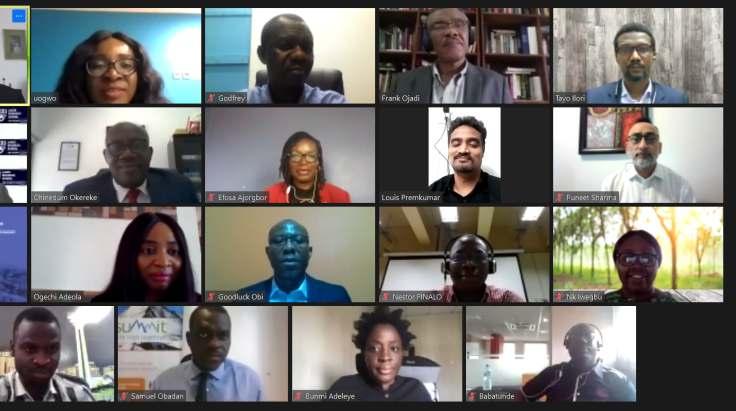
The session provided a platform to exchange ideas, network and discuss the latest trends, challenges and opportunities in finance and supply chain, especially considering the prevalent turbulence in the operating environment.
Strategy faculty, Chidi Okoro gave the opening remarks as he spoke on the importance of supply chain and finance to the health and sustenance of organisations. Operations Management faculty, Dr Frank Ojadi and the Managing Director of the LaCasera Company, Chinedum Okereke moderated the 2-hour session.
The keynote address was delivered by Dr Goodluck Obi, Partner & Head Consumer Markets, Audit Services, KPMG. In his presentation, Obi focused on the macroeconomic review, lessons from FMCGs and the post COVID-19 outlook for supply chain and finance.
According to data gathered, following the lockdown measures, Nigeria's Business Confidence Index fell for the first time to a negative index of 66.2 in May 2020. It remained negative until July, showing a loss of confidence amongst business owners. Business owners in the manufacturing construction and Agri/services sector contributed to the pessimism in July 2020 (-2.9, -0.5 and -4.8 respectively). However, a positive index of 33.7 in August 2020 indicates an optimistic outlook of the economy, and this is expected to continue in Q4 2020.
Obi highlighted the major challenges faced by organisations during the lockdown and the management actions implemented. He said, “Most companies battled with cash collections from key customers, increased impairment losses on key customer accounts, increase in average collection period and amongst others. In dealing with these challenges, most firms had to take swift management actions Many firms required bank guarantees from new customers, increased monitoring of their daily and weekly cash flow collections, sourced local raw materials to reduce dependence on foreign-based inputs and restructured the procurement and supply chain departments to respond to the new threats.” Obi added that the increase in the adoption of technology and digitisation is critical for the FMCG sector post-COVID-19.
The session was attended by Senior Manager, Supply Chain, WAMCO, Samuel Obadan; Finance Director, Reckitt Benckiser, Shekar Poojari; Group CFO and Head of Supply Chain at TGI Distri, West African Cubes, and Chi Pharmaceutical, Puneet Sharma. Other are; Head of Supply Chain, DUFIL Prima Foods, Pankaj Jajoo; Finance Director, the Lacasera Company, Godfrey Iriso; Head Supply Chain, Honeywell Flour Mills, Tayo Ilori; Head of Operations & Supply Chain, The Lacasera Company, Louis Premkumar; Supply Chain Director, Guinness Nigeria, Ngozi Aghomi; Head of Planning, Hayat Kimya Nigeria, Ugo Ogwo; Chief
Financial Officer, UAC Group, Ibikunle Oriola; GM Finance, PZ Cusson, Babatunde Oni; Supply Chain Lead, Nestle, Nestor Finalo and the Managing Director, TGI Distri Limited, Sunil Sawhney.
Also contributing to the session were LBS Faculty Chidi Okoro, Strategy; Dr Ogechi Adeola, Sales and Marketing; Vanessa Burgal, Marketing; Dr Obinna Muogboh, Operations; and Dr Arinze Nwokolo, Finance.

The executives and LBS faculty shared insights on the management of supply chain disruption and higher cost of imported raw materials due to the pandemic The discussion also h i g h l i g h t e d t h e a v e n u e s o f strengthening supply chains through credit policy; cash management and capital requirement post-pandemic.
Chief Financial Officer, UAC Group, Ibikunle Oriola shared the steps his company took to strengthen their working capital position. According to him, his firm conducted a stress test of their businesses for vulnerability. He stated, “What became very clear was liquidity and cash was critical to
maintaining operations for many of the businesses. We decided to conserve cash as the duration of the lockdown was not yet clear.”
Chi Pharmaceutical's Puneet Sharma also shared how his organisation leveraged innovation to ensure the running of their operations, sourced raw materials locally due to the travel bans, and strengthened relationships with customers which determined how they managed inventory.
Supply Chain Director of Guinness Nigeria, Ngozi Aghomi spoke on how her firm managed inventory during the lockdown. She shared how their stock policy was revamped before the
lockdown to hold more raw materials than usual, which cushioned the impact of the pandemic.
The executives concluded with an agreement on the essentiality of data for a dynamic route-to-market for business across several industries.
The interactive session is the second in the series; the first was conversations with top FMCG marketing and sales leaders across industries Lagos Business School remains committed to positively impacting the professional standards of business management in Nigeria and Africa.
Obi added that the increase in the adoption of technology and digitisation is critical for the FMCG sector post-COVID-19
“ ”
- Dr Goodluck Obi, Partner & Head Consumer Markets, Audit Services, KPMG.
What became very clear was liquidity and cash was critical to maintaining operations for many of the businesses. We decided to conserve cash as the duration of the lockdown was not yet clear.
- Chief Financial Officer, UAC Group, Ibikunle Oriola





The Sustainable and Inclusion Digital Financial Services (SIDFS) of Lagos Business School has been chosen to participate as a survey partner in the Global COVID-19 Fintech Market Rapid Assessment Survey.

Organised by the Cambridge Centre for Al Finance (CCAF) at the University of Camb partnership with the World Bank Group and the Economic Forum, the survey will collect and analyse data related to the impact that the COVID-19 pandemic on the FinTech Industry.
The assessment survey will help to understand which Fintech companies are best able to adapt to the pandemic and are under threat. According to CCAF, it will “capture responses from 15,000 FinTech firms in over 190 countries around world with the support of over 150 industry associations FinTech ecosystem partners.” LBS Faculty and SIDFS Lead, Professor Olayinka David-West will be steering course of the research in Nigeria. She has led several projects, conferences and discussions on technology, payments and other critical aspects of the Financial ecosystem in Nigeria and Africa.
“The coronavirus pandemic has impacted the services industry in significant ways. In response, the financial services ecosystem would also evolve, by reviewing business operations, practices and processes w exploring new product development techniques to consumer base that has also been impacted by the pandemic. The COVID-19 Fintech Market Rapid Assessment Survey provide relevant insights that will inform decision-making among financial service stakeholders and better FinTechs for the days ahead, even as the world transitions its new reality of a COVID-19 world. This initiative is well-timed, and I am thrilled to be a part of it” said David-West.
The survey which targets companies in FinTech and Financial Services (DFS) markets will run till July 30, to be published in the third quarter of the year, the report will aid FinTech industries and DFS providers to themselves better to cushion the impact of COVID-19 seek opportunities to scale and expand.

The SIDFS is a university-based research and initiative with the goal of creating an inclusive ecosystem for financial services. Through focused research as well as active engagement with all stakeholders in the industry, the Initiative furthers the case for financial inclusion.
Lagos Business School (LBS) has received a research award to conduct an international study on sustainability for companies in selected parts of Africa.
The study, which will be carried out by the LBS Sustainability Centre, will focus on how businesses in Africa are responding to long-term development aspirations in the light of the COVID-19 pandemic. Funding for the study was provided by a consortium of international organisations who share common goals of advancing sustainable development and using business as a force for good. The organisations include B Lab, Sistema B, B Academic, and the International Development Research Centre (IDRC).
The project will explore how companies in Nigeria, Mauritius and South Africa are integrating longer-term sustainable development objectives and targets into their strategies, and whether the United Nations Sustainable Development Goals (SDGs) provide a helpful framework for this integration process. It will further examine how the companies being studied are working to achieve these strategies, in addition to the role played by the COVID-19 pandemic.
Principal investigators on the project include Professor Chris Ogbechie, Lagos Business School; Professor Ralph Hamann, Graduate School of Business, University of Cape Town; Professor Kenneth Amaeshi, Business School, University of Edinburgh; Dr Ijeoma Nwagwu, Lagos Business School; Neeveditah Pariag-Maraye, University of Mauritius; and Dr Judy Muthuri, Nottingham University Business School.
Professor Chris Ogbechie, the Director of the LBS Sustainability Centre says, “Responsible business practice is the only path for businesses that want to have a true and lasting impact on the continent. Through this research effort, we begin to map the landscape of responsible business across Africa more closely and provide leaders on the continent a roadmap to navigate these uncertain times. Insights from this research will help our business leaders build back better as we emerge from the pandemic”
Commenting further on the significance of the study, LBS faculty, Dr Ijeoma Nwagwu said, “This research project is significant because it explores the risks and opportunities confronting businesses that deploy sustainability thinking and tools to advance development in African countries as diverse as Kenya, Nigeria, South Africa, and Mauritius. There are a few studies of this nature. Our study illustrates the possibility of a shared vision and an aspirational narrative for a sustainable future in African countries.”
The project seeks to generate direct and tangible benefits for the participants, as well as other practitioners and policy-makers as they will be presented with opportunities for discussion. Findings from the study will be widely published as they emerge.
The LBS Sustainability Centre consolidates theory and practice on sustainability, builds leadership skills and supports constructive dialogue and collaboration between business, government, civil society, and academics to find solutions to critical sustainability challenges.
On Tuesday, August 11, 2020, Lagos Business School hosted select marketing and sales leaders from Nigeria's FastMoving Consumer Goods (FMCG) sector to an interactive online session.
The session provided a platform to exchange ideas, share insights and support the strategic o p e r a t i o n s o f p a r t i c i p a t i n g organisations, especially considering the prevalent turbulence in the operating environment.
Conversations were moderated by LBS Faculty of Strategy, Chidi Okoro and began with Managing Director of a market research firm, Milward Brown Nigeria, Ugo Geri-Robert, who was the guest speaker at the session GeriRobert delivered a presentation on the changing behaviour of Nigerian consumers in the light of emerging trends in a post-COVID era.
According to Geri-Roberts, Nigerian consumers have become more concerned about their personal finance, health and food security. She explained that consumer engagement on digital media has surged because of the pandemic. Consumers seek new information, and the only way brands can win is by providing this information in the form of solutions for surviving the pandemic.
Geri-Roberts named some brands who are leveraging this new behaviour and needs to deliver unique experiences to consumers. An example is Dano Milk which is providing relief materials to vulnerable neighbourhoods through its Nominate A Neighbourhood campaign. Other examples mentioned are Spar, Heineken Lagos Fashion Week and Maggi. She also advised brands in the FMCG sector to aid equity through corporate social responsibility (CSR) and empowerment schemes for members of their host community.
“The crisis has triggered the need to be identified as a purposeful brand, a brand that's socially responsible, a brand that empowers people”, she said.
Anchored by Associate Professor of Marketing at LBS, Dr Ogechi Adeola, the session was attended by individuals

Deciding to study for an MBA is a significant step for young managers and professionals. But making such a decision in the middle of a global health and economic crisis can be more challenging than usual.
who hold key roles in the intersection of Sales and Marketing in multinationals i n t h e c o u n t r y T h e y i n c l u d e
Commercial and Marketing Director, Procter & Gamble, Mokutima Ajileye; Marketing Director, Unilever, Nsima Ogedi-Alakwe; Sales Operations Manager, Nestle, Olutayo Olatunji; Head of Sales, GSK Consumer, Soji Awotiwon Others include Country Manager, William Grant and Sons Nigeria, Frances Nwosa; Commercial Director, Nestle, Khaled Ramadan; Vice President, Consumer Development, Unilever, Felix Enwemadu; and Marketing Director and Division Lead –Homecare, Unilever, Bunmi Adeniba.
The executives agreed that brands in the sector need to have a granular understanding of how the pandemic hit d i f f e r e n t c o n s u m e r s e g m e n t s
According to Ogedi-Alakwe, “We, as FCMG companies, need to understand what has changed with our consumer's needs and how our portfolio profitably addresses those needs ” She added that consumers have limited spending capacity this period and brands must take their product quality more seriously to prevent the spread of negative word of mouth for their products.
Contributing his perspective, Nestle's Tayo Olatunji opined that sales and marketing heads must manage their route-to-market creatively if they do not want to pass the burden of i n c r e a s e d p r o d u c t i o n c o s t s t o consumers. According to him, it is the responsibility of these managers to ensure that wholesalers, who are essential components of the value chain, are trained to be professional as they are the ones who interact with retailers and shoppers.

The professionalism gap in the sales and marketing sector is what the Lagos Business School Sales Academy aims to bridge. Run by the School's Sales and
Marketing faculty, Dr Ogechi Adeola, Dr Tayo Otubanjo and Vanessa Burgal, the Academy provides salespeople with practical tools required to improve their performance standards and win in today's competitive market. The Academy has delivered capacitybuilding sessions to the staff of sector g i a n t s , s u c h a s N e s t l e a n d FrieslandCampina Wamco.
Sharing instant feedback from the session, one of the participants described it as “well-handled and very insightful”. The interactive session is the first of its type since Lagos Business School moved its programmes online and the School remains committed to positively impacting the professional standards of business management in
This September, 49 aspiring managers resumed for the Lagos Business School Full-time MBA with a resolve to progress in their career despite the crisis, and for good reasons The business landscape is uncertain. The job market has evolved, and professionals need to be amply prepared for the new demands of companies and industries.
For Chung Tsz, a citizen of Hong Kong who has experience in building Africafocused NGOs, “technology-enabled businesses and de-globalisation will be the themes to watch in the postpandemic world. The world will desperately need globally connected experts, to move businesses and ideas across Africa, Asia, Europe and America ” He believes that the LBS experience will be a game-changer for him, as he will build up a valuable network in Africa and potentially create more impact across the globe.
The most experienced member of the class, Adetola Okunola plans to relaunch his career as a management executive after the pandemic. He said, “the industries I have in my purview include Energy (Integrated Oil and Gas) and Management Consulting. LBS will avail me the technical know-how and emotional and moral fortitude required from management executives. These and other skills gained from LBS would be integral in the attainment of my objectives”.
Joining the class with experience from KPMG, Olamide Onaolapo said the effects of the pandemic on the job market influenced his decision to join the programme. “A lot of organisations have not been recruiting because of the p a n d e m i c . A n d s i n c e I w a s transitioning, I decided to acquire more knowledge as the world deals with a new reality. I believe LBS can prepare me for the future of work by imparting
knowledge and imbibing in me the culture to enable me to adapt and meet the demands of the post-pandemic world.”
The Full-time MBA 19 class is an impressive mix of professionals across industries – banking, professional services, law, oil and gas, and so on–including an Obama Fellow from Cameroon. On why she chose Lagos Business School, Faith Mpara said, “The primary reason that I chose LBS is that it is in Nigeria. I have deep admiration for Nigerians and their exploits in business. I also chose LBS because it is one of the few schools that offered extensive support during the application process. I had staff call on Sunday and assist me for hours when I had challenges with my submission. This is uncommon because I have completed applications with several schools and could not proceed because support was absent.”
Mpara, who is a beneficiary of the LBS Scholarship Scheme, also added, “LBS has an excellent reputation and financial support system for students. Apart from the scholarship scheme, the rest of my tuition needs are catered for b y t h e M a n d e l a I n s t i t u t e o f Development Studies (MINDS) LBS' reputation made this easier than it will have otherwise been.”
Also sharing his experience about the support offered by the School, Chung said, “I appreciate how far the team at LBS go to see that we get the most out of our MBA experience. For example, a former employee reached out to me to offer advice at the point of leaving his role at LBS. That says a lot about the School.”
Chung said, “I appreciate how far the team at LBS go to see that we get the most out of our MBA experience For example, a former employee reached out to me to offer advice at the point of leaving his role at LBS. That says a lot about the School.”

Although the delivery format of the Full-time MBA requires students to attend physical classes every weekday, the new-normal demands that they take courses online until it's safe to gather again, but some candidates do not consider this a challenge. One of those is Olufisayo Olowo, who admits that COVID-19 has changed world
dynamics but expects LBS to retain all the benefits of the Full-time MBA even as it holds online. She also sees an opportunity. “As seen with major corporations, work will forever be a mix of online and offline interactions. By a d o p t i n g t h e s e t e a c h i n g methodologies, LBS prepares me for the world of work”, Olowo said.
Lagos Business School's Full-time MBA is highly ranked. The two-year programme offers young professionals the opportunity to gain managerial skills and competencies to jump-start their career and business in emerging economies.

Africa's leading graduate business school, Lagos Business School, has appointed Professor of Strategic Management, Chris Ogbechie as its Deputy Dean.
In his reaction to his appointment, Professor Ogbechie said, “it is always an honour to serve, particularly at this time of a very turbulent business environment when many businesses in Nigeria and Africa will look up to LBS for assistance in navigating this new normal caused by Covid-19”.
The Deputy Dean holds a first-class degree in mechanical engineering from Manchester University, an MBA from Manchester Business School and a PhD in Business Administration from Brunel Business School in the UK.
The Lagos Business School chapter of the Beta Gamma Sigma society has been bestowed the Highest Honours status for the 2019-2020 academic year. The Highest Honours status is the highest distinction possible for Beta Gamma Sigma chapters.

Beta Gamma Sigma (BGS) is the exclusive business honour society for students enrolled in business and management programmes accredited by the Association to Advance Collegiate Schools of Business (AACSB).

The Highest Honours status results from the outstanding work done by the Lagos Business School BGS team and its continuing support of the society. The Honour means Lagos Business School's BGS chapter is eligible to be considered for the Outstanding Chapter of the Year award. It also means the chapter will be recognised at global BGS events, on social media, and in publications.
Earlier in 2020, Lagos Business School alumna, Ibukun Awosika, was named the recipient of the 2020 Beta Gamma Sigma Business Achievement Award. The award is presented in honour of individuals who have made a significant achievement in business.
The appointment was announced on Monday, June 15, by the University Management Council and became effective on July 1, 2020. Professor Ogbechie has been a member of the Lagos Business School Management Board since March 2012 and is the founding Director of the School's Sustainability Centre. He teaches strategy, sustainability and corporate governance at the School and is a visiting professor at Strathmore Business School, Kenya and the University of Kigali, Rwanda.
Speaking on the appointment, Lagos Business School Dean, Professor Enase Okonedo said, “The combination of Professor Ogbechie's excellent academic qualifications, experience, drive, and values stand him in good stead to assume this responsibility, and I appreciate his willingness to take on this role.”
He has decades of academic and non-academic experience, with the latter derived from his work as Head of Marketing/Sales at Nestle Nigeria and from his consulting work with Nigerian, Ghanaian and Kenyan firms. While in Nestle, he held international positions in Malaysia, Singapore, and Switzerland. He was the Chairman, Board of Directors, Diamond Bank and is on the board of several private and public companies including National Salt Company of Nigeria (NASCON), Summit Healthcare Group, Health Partners, ActivEdge Technologies, Hubmart Stores, and Palton Morgan Holdings.
Professor Ogbechie's research interests are in strategy in turbulent environments, strategic leadership, board effectiveness, and corporate sustainability. He has several publications in financial services marketing, strategic planning, corporate social responsibility, and corporate governance.

Lagos Business School Dean, Professor Enase
Okonedo has been appointed to the Board of the Principles for Responsible Management Education (PRME) The Principles for Responsible Management Education is a United Nations-supported initiative that raises the profile of sustainability in schools around the world and equips today's business students with the understanding and ability to deliver change tomorrow.
Announcing the appointment at the PRME Annual Conference, Chair of the Board, Ilian Mihov said, “The Board members are all dedicated to the PRME Principles, and each one of them is an experienced and committed leader in the area of responsible management education Board members are PRME supporters willing and able to advance PRME's vision, acting in a personal, honorary and unpaid capacity.”
As a member of the PRME Board, Okonedo will “contribute to setting the strategic direction for the future of the initiative” alongside 14 others including the Associate-Director General for Education, UNESCO, Stefania Giannini; President, ISAE Brazilian Business School, Normal Arruda
Responding to the appointment, Okonedo said, “At a crucial time such as this, the importance of responsible leadership cannot be overemphasised. Business leaders are faced with tough decisions that can influence the sustainability of their organisations positively or otherwise, thus making responsible management education a necessity now more than ever. I am delighted to be able to serve on the UN PRME Board in a capacity that allows me to advance its mission to transform business and management education, as well as develop responsible leaders”.
Lagos Business School's mission to develop responsible managers and business leaders is in line with that of the PRME. The School has been a signatory to the initiative since 2011 and has remained committed to the implementation of its six principles: purpose, values, method, research, partnership, and dialogue.
Dr Eugene Ohu, a faculty at Lagos Business School (LBS), has won a grant of $234,000 from Templeton World Charity Foundation, Inc (TWCF) to conduct a two-year virtual reality research. The research project titled “Teaching Children Empathy and Compassion through Virtual Reality Games” will explore the potentials of virtual reality (VR) for character development. The grant was awarded under TWCF's Global Innovations for Character Development (GICD) initiative.
Dr Ohu runs a Human-Computer Interaction (HCI) Lab at Lagos Business School, where he explores the implications of the immersive, interactive and perspective-taking characteristics of technologies like computers, mobile devices and virtual reality (VR) for character development, learning, behaviour modification, wellbeing and productivity.
The TWCF funded two-year intervention and research project seeks ways to grow the character traits of empathy and compassion in a diverse society like Nigeria, where there are multiple expressions of religious, cultural, social and economic identities. Targeting an initial group of teenagers, who make up more than 60 percent of Nigeria's population, the study hopes to explore the perspective-taking capabilities of VR to increase understanding for the identities of others different from ourselves. Speaking on the research project, Dr Ohu said “It will be an immersive virtual reality (VR) experience where teenagers take the perspectives of
Dean of Lagos Business School, Professor Enase Okonedo has joined the board of directors of the Graduate Management Admission Council (GMAC), a global association of leading graduate business schools.


GMAC provides world-class research, professional development opportunities and assessments for the graduate management education industry, designed to advance the art and science of admissions. It owns and administers the Graduate Management Admission Test™ (GMAT™) exam, the most widely used graduate business school assessment, recognised by more than 7,000 programmes worldwide.
As the only African on the Board, Okonedo will contribute to creating solutions to the challenges that graduate management education faces on the continent. She said, “The global pandemic has placed new demands on individuals and industries, and business schools in Africa must deliver as it concerns the creation of educational content that will prepare students for quality leadership and
ethnic groups different from theirs, to appreciate their identity and share in their sufferings. We also hope to train teachers at the study schools on the new VR teaching models, so as to incorporate them into the Civics and Social Studies curriculum of secondary schools”
Immersive VR are computer-generated environments where users experience a digital version of the real world where they can interact with objects and other people. It offers an opportunity to create a more personalised and engaging experience for learners.
Dr Ohu added, “Although VR is fun, my research collaborators and I have broader and more ambitious goals which should see a greater deployment of VR in teaching, learning and development at all stages of a person's life. I particularly want to see it deployed as a complementary learning resource in training at the Lagos Business School”.
Virtual Reality is considered by many to be the biggest thing after the internet, and its use is predicted to increase in the coming years. It is therefore imperative that stakeholders in character development and education take steps to understand the benefits of VR, and beyond academics, to teaching cultural competencies in today's interconnected, global society.
Other collaborators in the project include Judith Okonkwo, founderofImisi3D, an Extended Reality creation lab in Yaba, Lagos, and , a digital games expert at Prof Karen Schrier Marist College, USA.
management. It is a great opportunity to serve at this time.”
“We're excited to engage and collaborate with some of the brightest minds from regions in the world experiencing a renaissance in graduate management education,” said Sangeet Chowfla, president and CEO of GMAC said about the new appointees. “We've witnessed multi-year periods of growth in emerging markets around the world, and it's likely that trend continues during and beyond COVID-19,” Chowfla continued. “Having diversity and global perspective on our board better enables GMAC to bring solutions and ideas to the marketplace that help address the unique challenges and opportunities associated with our industry.”
Other newly appointed board members include Ranjan Banerjee, Dean, Professor of Marketing, S.P. Jain Institute of Management and Research; Soojin Kwon, Managing Director, Full-Time MBA Admissions and Program, Stephen M. Ross School of Business, University of Michigan; and Jay Nibbe, Global Vice Chair-Markets, Ernst & Young Global Ltd as an independent director.
In a similar vein, Okonedo was also recently appointed to the Board of the United Nations Principles of Responsible Management Education (UN PRME).
As one of GMAC's 229 member schools, Lagos Business School engages closely with other members of the Council to grow management talent in Nigeria and Africa.

No one can fully estimate the negative effects of the global pandemic that hit most cities & countries in the world. From corporate shutdowns & employee layoffs to millions of fatalities because of the virus, the ripple effects have been felt in all strata of economy and social life. As governments struggled to mitigate these negative effects amidst societal upheavals, it became imperative for organisations and influential individuals to lend a hand in the fight to keep hope afloat amongst the general populace.
The Lagos Business School Alumni Association (LBSAA) is one of such institutions that has risen to stand in this gap. The very foundation of the LBSAA is on the premise to impact society, and to create “an oasis of sanity” in society. Alumni classes took up the challenge of distributing palliatives to various communities and providing services such as health awareness campaigns and diverse medical services. Some of these activities were chronicled in our previous edition.
In this edition, we turn our focus on a one individual who is blazing the path in the mission to create societal impact and carrying his organisations along in the feat.

Known for his approachable & humble personality, Anil Grover is a silent, powerful force in the health sector. Six years after migrating to Nigeria from Kenya, Grover (who is now a titled Nigerian Chief) completed the Advanced Management programme (AMP 22) in 2010. It was during the programme that he learnt the importance of Corporate Social Responsibility. He took up the lesson and has not looked back since Chief Grover also concluded the Chief Executive programme (CEP 23) in 2015 and is the current class president.
Chief Grover is the Founder, Managing Director/Chief Executive Officer and Board Chairman of Grover Medical & Diagnostic Centres and Grover's Hospitals He is a Pharmacist with a Masters' in Healthcare Management, with over 20 years spent working for Ranbaxy Inc. in Asia and Africa prior to establishing companies. He is a proud Rotarian and Chairman of healthcare projects of the Rotary Club of Lagos Island, District 9110 Grover is a member of the Executive Council of Nigeria-India Chamber of Commerce & Industry (NICCI); board member and medical coordinator of SAHBA (an Indian community); active member and ex-Vice President of Indian Professionals Forum (IPF) at the Indian High Commission, Nigeria.
He has also been the Chief Marketing Director of Mecure Healthcare Ltd, CEO of Afriglobal Diagnostic Centre, and Consultant & Advisor to various states on Public Private Partnerships (PPP) for their healthcare projects.
Since the COVID-19 pandemic outbreak in the Country, Chief Anil Grover has significantly contributed to the battle against the rapid spread of the virus in Lagos State. He is the lead project coordinator for Lagos State Ministry of Health and the National Centre for Disease Control (NCDC) as part of his social responsibility and personal commitment to healthcare and the wellbeing of the community. Using these platforms, Chief Grover has initiated, contributed, and participated in various CSR projects aimed at improving the wellness of communities in Lagos State.


& Breast Cancer awareness
Every other month, Grover Medical & Diagnostic Centres organise diagnostic camps aimed at providing diagnostic services to the underprivileged in society who have no insurance and lack access to adequate medical facilities. In collaboration with Working Together Healthcare Foundation, (an indigenous non-profit organisation focused on health, women empowerment & education) and Rotary Club Lagos, Chief Grover's organisation facilitates Cervix Cancer screening and Breast Cancer awareness campaigns every quarter. Despite the Pandemic, they were able to continue this trend in 2020, including campaigns in Ikota and
Obalende Police Barracks, aimed at female police officers and wives of police officers. About 262 individuals and 150 women, respectively, were impacted by the one-day campaigns. Cervix cancer vaccinations were administered and treatment was provided to those who had tested positive. Recognising the need for food items during this period, the organisations also supported the recipients with food palliatives during each medical camp.
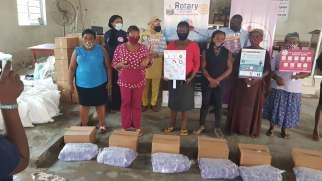
Since the COVID-19 pandemic outbreak in the Country, Chief Anil Grover has significantly contributed to the battle against the rapid spread of the virus in Lagos State.
In conjunction with the Indian Community in Nigeria, a 50-bed isolation centre was built and equipped by Grover Medical & Diagnostics this year.
Apart from the palliatives given during the medical campaigns, Chief Grover also distributed palliatives during the pandemic through his temple's NGO, SPAN, to 200 LAWMA workers at Eti Osa local government in Victoria Island. They also donated free facemasks and hand sanitizers.

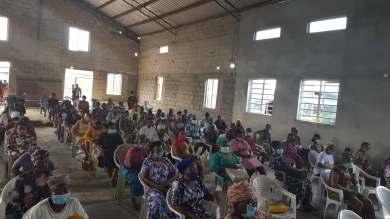

In conjunction with the Indian Community in Nigeria, a 50bed isolation centre was built and equipped by Grover Medical & Diagnostics this year. Located in Ajao Estate, the centre provides free ambulance services, consultation, treatment & food (if required) for the two weeks needed for proper isolation.
As the Chairman of healthcare projects in Lagos for Rotary International, Chief Grover has contributed both financially and otherwise in setting & operating annual eye cataract surgery camps. Medical doctors & personnel offer free
surgeries and treatment to an average of about 450 people every year.
Blood Donation
In partnership with the Ministry of Health, Chief Grover and his wife, Dr Mrs Arvinder Grover, are not only regular blood donors; they also organise blood donation camps every quarter for the Lagos State blood bank. This crucial activity was supported by the Grovers to save lives in emergency situations.
Looking forward
For Chief Grover, the gratitude from the recipients of these services brings joy and satisfaction, especially for those who travel from villages with near-blindness and return with clear eye vision after the removal of cataracts. He is most passionate about reaching people who do not have access to quality healthcare.
When asked what the future holds, Chief Grover expressed his desire to expand the scale and scope of these activities, and into more communities. Known for his patriotism for Nigeria, Chief Grover believes in the potential of the nation and its youth.
Does Service Sector Growth Cause Agricultural and Industrial Development? A Dynamic Econometric Approach
Efficient Market Hypothesis in the Presence of Market
Imperfections: Evidence from Selected Stock Markets in Africa
and Finance
Dynamic Linkages between Mobile Money and Banks' Performance in Nigeria: An Autoregressive Distributed Lag (ARDL) Approach
Social Impact Investing and Impact Financing
5.
Corporate environmental reputation management and financial performance of environmentally sensitive companies in Nigeria
Innovative Work Behaviors: Role of Employee Engagement & Organizational Citizenship Behaviors
The effect of servant leadership on employee turnover in SMEs: the role of career growth potential and employee voice
The Extractive Sector and Corporate Social Responsibility: A Case of Chevron Nigeria
Multinational Enterprises' Subsidiary Initiative-Taking: A Model for Implementing Corporate Social Responsibility
Can critical success factors of small businesses in emerging markets advance UN Sustainable Development Goals?
International Journal of Management, Economics and Social Sciences
International Journal of Economics and Financial Issues (IJEFI)
International Journal of Management, Economics and Social Sciences
The Nigerian Accountant
Cogent Social Sciences
Indian Journal of Industrial Relations: A Review of Economic & Social Development
International Journal of Entrepreneurship and Small Business
Communication - South African Journal for Communication Theory and Research
International Journal of Multinational Corporation Strategy
World Journal of Entrepreneurship, Management and Sustainable Development
Foreign Direct Investment and Tourism Development in Africa
Tourism Analysis: An Interdisciplinary Journal
Adeola Tourism & Hospitality
Subject Category S/No. Title
1. Operations Management
Delays in customs clearing processes in sub-Saharan African port: An analysis and evaluation of the 'Pre-Arrival Assessment Report' (PAAR) process at a Nigerian seaport
Subject Category S/No. Title
1.
Branding & Marketing
Using Quelch's Tools to Explore and Put Dual Marketing into Practice: Benefits, Opportunities and Risks – Ogechi Adeola & Obinna Muogboh
2.
Let's Go Green - Planet, People, Product, Packaging, Pricing, and Promotion (6Ps)Venessa Burgal & Ogechi Adeola
Journal of Business Diversity
Editor(s), Book title and Publisher
In Palazzo, M., Foroudi, P. and Siano, A. (Eds) Beyond Multi-channel Marketing, Emerald Publishing Limited, pp. 39-54.
In Foroudi, P. and Palazzo, M. (Eds) Sustainable Branding: Ethical, Social, and Environmental Cases and Perspectives, Routledge.
The case describes the three strategic changes that occurred in Al Dorado L mited, and the corresponding human resources management strateg c changes made by the organisation in response to external and internal demands placed on the organisation. During the last strategic change, the organisation adopted a very stringent human resources management strategy nvolving recruitment, on-boarding development, performance management and rewarding processes aimed at building the pipeline of leaders to drive the organisation in the 21st century. Through an external consultant and in a process that was not made known to the old managers, the organisation decided on the old managers that were to be allowed into the new managers' scheme and those to be repositioned to be trainers and mentors. The process adopted in building the pipeline of leaders gave rise to two antagonistic groups within the organisation that were at loggerheads with each other. Paul, being one from the old cohort and the assumed leader of the cohort, felt the organisation was not fair to them and decided to get answers to some questions from his immediate boss. After the encounter with his boss, Paul felt that Al Dorado Limited had created a situation that was toxic to the performance of his cohort, and that it was time for his cohort to move on in their career, but he was not sure what the decision should be.
Okechukwu Amah1.
Talent Management and Succession Planning in traditional Igbo businesses –Nkemdilim Iheanachor & Chidi Okoro
In Adeola O (Ed ) Indigenous African Enterprise: The Igbo Traditional Business School (I-TBS), Emerald Publishing Limited. Strategy
Virtue Ethics Traditions in Africa: An Introduction – Kemi Ogunyemi
The relevance of African virtue ethics traditions today – Kemi Ogunyemi
Subject Category Title
In Ogunyemi, K. (Ed.) African Virtue Ethics Traditions for Business and Management, Elgar.
In Ogunyemi, K. (Ed) African Virtue Ethics Traditions for Business and Management, Elgar.
Books Faculty
Marketing Marketing in Healthcare-Related Industries
Title Abstract
Publisher
Ogechi Adeola Information Age Publishing
Author
The case describes the early career of Abiodun Chukwu, a successful and hard-working engineer who dedicated his work life to being ethical and doing things that would benefit his organisation. While he was project manager of a project his organisation was executing for another company, he worked closely with the Managing Director of the client organisation The MD had ethical and negat ve organisational-politics issues in his company and was secretly searching for someone to help out. He discovered that Abiodun possessed the personality and work ethics he was looking for. Abiodun was offered the position of a manager though he had no managerial skills. Abiodun accepted the offer and dedicated his whole life to it. Unfortunately, he could not work through the messy unethical and office-politics mesh. While supervising an important project, something went wrong which led to a huge loss for the company. Abiodun was eventually relieved of his position after two and half years of working in the new organisation.
Okechukwu Amah
The case is set at the final league game for Manchester United Football Club (shortened to United) in the 2018/19 Premier League season, played at Old Trafford, United's home stadium in May 2019. The team was expected to easily beat their opponents, Cardiff City, a team already relegated to the lower division and a team they had beaten 5 – 1 in the first leg in Cardiff's home ground. The surprising result was a 2 – 0 home loss to Cardiff, bringing down the curtain on a poor run of six losses, two draws and just two wins in United's last 10 matches. Surprisingly, this poor run came after the coach Ole Solskjær's confirmation, following a string of earlier brilliant results. The defeat confirmed the club's failure to finish in the top-four position in the league table, a position that would have guaranteed them a place in the UEFA Champions League in the next season.
This is a real–life case involving employees of a mult national company located in Nigeria. The case throws up issues that centre on human resources management (HRM) n general and, more specifically, on the challenges that often arise in the application of “global best practices” in different cultural settings. In this case, Bayo (protagonist) made repeated and persistent “advances” (of a sexual nature) to Tayo, a female intern in the organisation. From the point of view of the human resources policies of the organisation and global best pract ces these “advances amounted to sexual harassment. Bayo, as the accused, contended that the “advances” represented culturally acceptable methods of proposing marriage. Events subsequently proved Bayo r ght as both employees got married, even though he had paid the price by receiving the maximum punishment for the offence of sexual harassment.
BudgeIT: Promoting Inclusive Governance with Big Data
This case study examines and discusses how a Nigerian civic organisation - BudgIT, adopts a data-driven approach to improve the standard of transparency and accountability in government. Hence, the case discusses how BudgIT utilises digital technology to promote an open data campaign by simplifying government budget and matters of public spending to trigger citizen engagement, selfempowerment of citizens and institutional improvement, to facilitate societal change. BudgIT utilises the power of digital technology and big data to be a socially responsible organisation by giving something back to the society that enables them to prosper and grow.
Asten Global Ltd was set up over a decade ago and had experienced significant growth in local commodity trading. The company had established good working relationships w th many commodity farming households and cooperatives in different communities and also invested in warehouses for the storage of grains and other agricultural products. Asten Global Ltd had no farms but paraded very good buyers who had excellent interpersonal skills and spoke the local languages of the communities in the northern parts of Nigeria where they traded. Tony, the Managing Director of Asten Global Ltd, had just returned from a training programme on exports and was being 'challenged' to apply the knowledge he had acquired during the training to his business. Specifically, he was required to prepare a quotation for a new customer who needed some hibiscus flowers for his factory in India. Tony was yet to export any commodity and therefore felt quite apprehensive, although he viewed it as an opportunity to expand his market. Before calling on his staff to deliberate on the way forward, he promised to send the quotation to the customer in 10 days' time.
The shortfall in installed processing capacity (coupled with the strong possibility of a protectionist ban on imports) and the avoidable wastage arising from that shortfall were evaluated by Mumbai Agro Processors Ltd (an Indian company) as offering an attractive business opportunity, which led it to decide to invest in a processing plant in Niger a des gned to produce triple tomato concentrate for downstream medium-sized packaging companies. PTPCL was sited in Danja in Katsina State (about 1,000km from the Lagos seaport by road), which was at the centre of a major tomato growing area, as well as being adjacent to other major growing areas. PTPCL fashioned a tomato procurement policy based on the use of a posted price per kilogram of tomato, which did not go down well with the smallholder farmers, who were the main suppliers of tomatoes to the company. Crucially, the company chose not to establish an active physical presence in the raw tomato market (to engage with the farmers and/or the dealers) but preferred to wait passively for the farmers to come to it. At issue, therefore, was a fundamental question of future supply strategy: was the company to continue to depend for its principal raw material on farmers who had so far proved to be unreliable and unpredictable suppliers or should the company make a bold departure from the past and take, as it were, its future into its hands by venturing into other forms of sources of supply so as to become assured of secur ty of supply as far as its tomato requirements were concerned? This issue was to be decided in an executive committee meeting involving the CEO and the Supply Chain Director, among others.
Frank OjadiSplendid Ruby Scents Limited was a local perfume company that aimed to capture a considerable size of the imported-productsdominated scents market in Nigeria. The company made some impressive sales when it started, earning about 40% net profit just in its second year of operation. Tunde, the CEO, motivated by the initial success, constituted a management board and expanded to other major cities in Nigeria with 30 different fragrances of perfume in stock. The increase in sales would not have been possible without the efforts of the sales force and the regional sales managers (RSMs) that covered the three major territorial hubs of the company – Lagos, Kano and Abuja. Chioma, the sales director, had the responsibility to increase the company's sales by 25% for the year 2018. As of June, the company's sales performance was about half of that of 2017 as at that time The sales team believed the new compensation scheme designed by Chioma was responsible for their poor performance. Chioma, therefore, had the onerous task of trying to align the personal and business interests of her RSMs, and the motivation of the sales team with the goals of the company before the next board meeting She had only a week to come up w th act on plans
Uchenna UzoFinance
FGN Bonds:
Bond Valuation
This case is about a fictitious character called Uju Adewale that is faced with the task of valuing the Federal Government of Nigeria (FGN) bonds in her bank's portfolio. In examining the issues facing Uju, students have the opportunity to learn about bonds, bond valuation and pricing, the yield curve, interest rate risks associated with bond investments, and the possible returns from investing in emerging market government bonds.
Chukwunonye Emenalo
This case is the story of an African entrepreneur based in Nigeria. He started his entrepreneurial journey from childhood as an apprentice in his father's arts and crafts workshop in southern Nigeria. Though he wanted to continue his studies to tertiary levels, the challenges he faced led him to an interim apprenticeship arrangement in an uncle's business in the open market. There he found himself making so much money that he started his own business and gave up on continuing his studies. Fortunately, he was advised to go back to school, based on the conviction that he would have a better quality of life and business with more education. He took the advice and embarked on part-time studies so he could continue to run his business. With time, he experienced first-hand, how this made a significant positive impact on his person and his business. All along, profit had been the sole aim of his business of selling children's toys. However, while at school, he learned that value drives profits and so it was better to seek first to create value or be impact-driven. It took him a while to accept this idea and when he eventually did and began to run his business in a value-driven manner, he was amazed at how both his personal brand and business experienced an astronomic rise in reputation and profits. He has since continued to be value-driven, transforming his toy company into an African-themed toy business for local and global markets. His business now attracts global partners as suppliers and customers, and he has been featured by many local and global media houses, as well as won several awards based on his impact-driven activities. The case is a good illustration of African indigenous entrepreneursh p and showcases the advantages of the apprenticeship system.
In the first ever virtual election in the history of the Lagos
Business School Alumni Association, the Governing Council, comprising all Alumni Class Presidents, voted for a new Vice President and Secretary. Per the tenure stated in the charter of the Association, the two positions are up for election every two years; the position of President is automatically filled by the previous Vice President.
After two years as President, Mrs Clare Omatseye oversaw her last meeting in the role on Saturday, May 9, 2020. Under her leadership, the Association made great strides in the health sector, as part of the mission to impact society.
After nomination by other alumni, the contestants were examined by the Executive Council (EXCO) to ensure that their profiles suited established criteria for election.
Uzo Ofoma Chukwuma
The following Alumni who fulfilled the conditions for election were then put forth before the Governing Council for election
Mr Apochi is the Managing Director/Chief Executive Officer of Unified Payments. He is the Founder and Director of PayAttitude, a payment scheme focused on mobile & digital payments, with a patent for the technology and process enabling phone numbers to be used for different transactions across all channels; and Hope Payment Service Bank, Nigeria's premier digital-first bank.
Before becoming the MD/CEO, he held the positions of Group Head, Corporate Services; Company Secretary & Head of Legal Services and Executive Director of Unified Payments Prior to joining Unified Payments, he was the Regional Legal Head at Union Bank and Legal Counsel at FSB International Bank (now Fidelity Bank), respectively.
Mrs Uzoma Dalhatu (SMP 64) and
Mr Babatunde Daramola (AMP 25)

For Vice President:
. For Secretary: Mr Agada Apochi (AMP 22)
Utilising digital polls, the Governing Council threw in their votes for their candidate of choice. At its end, Mrs Dalhatu and Mr Apochi emerged the Secretary-elect and Vice President-elect of the Lagos Business School Alumni Association respectively.
Mrs Dalhatu is the Assistant Company Secretary and Legal Manager for Old Mutual Nigeria. Before taking up her current role, she was the Legal Advisor for the Old Mutual subsidiaries in Nigeria. Prior to this, she served as the Executive Personal Assistant to the Group Chief Executive Officer for Old Mutual West Africa.
Prior to joining the Old Mutual Group in 2012, Uzoma, as she prefers to be called, was the Team Lead, Company Secretarial services at Dalhatu and George Legal Practitioners. Earlier on, Uzoma worked with Zenith Bank Plc as a Customer Service Officer.
Uzoma has over 14years of diverse experience gained in the Corporate Sector, notably the Insurance and Banking sectors, and private practice. Her competencies include Legal and Regulatory Compliance, Company Secretarial services, Legal Advisory, Dispute Resolution and Stakeholder Management. She has a bias for Corporate Governance and Sustainability Business Strategies.

Uzoma holds a Bachelor of Law (LL.B) degree from the University of Ibadan, Nigeria and a Masters of Law (LL.M) in Oil and Gas Law from the University of Aberdeen, United Kingdom. She is a Barrister and Solicitor of the Supreme Court of Nigeria. She is an Associate of the Chartered Institute of Arbitrators, an Associate of the Institute of Chartered Secretaries and Administrators of Nigeria and a member of the Society for Corporate Governance Nigeria. She is an alumna of the Senior Management Programme (SMP 64) of Lagos Business School (LBS).
Uzoma is interested in youth mentoring. She is a melophile and a budding poet.
Agada Apochi Vice PresidentMr Apochi is a Barrister & Solicitor of the Supreme Court of Nigeria. He is also a fellow of the Institute of Credit Administration; a chartered Mediator & Conciliator; Certified Associate of Capability Maturity Model Integration Institute (CMMII, USA); and a Honorary Chartered Banker of the Chartered Institute of Bankers, Nigeria. He is an alumnus of the University of Jos (Bachelor of Law); Nigerian Law School (Barrister-at-Law); Rivers State University (Master of Law); Columbia University, USA (Master of Arts in Organisational Psychology & Change Leadership). He has also taken leadership & management training at Harvard, INSEAD, Cornell, among other business schools. He is an alumnus of the Advanced Management Programme (AMP 22), which has won the Best Class Award five times. Before his election as the Vice President of the LBSAA, Mr Apochi was his Class President. He is currently working towards his Doctor of Business Administration (DBA) degree at Swiss Business School.
On Saturday, June 27, 2020, Clare Omatseye, EMBA 3, (CEO, JNC International Ltd) handed over the leadership reins of the Lagos Business School Alumni Association (LBSAA) to Frank Aigbogun (CEO, BusinessDay Media Ltd). Prior to this, Omatseye and Aigbogun were the President and Vice President, respectively, of the Association from June 2018.

In an exclusive handover ceremony carried out with strict
adherence to the COVID-19 protocols at Protea Hotels, Kuramo Waters, the event also saw the induction of the newly elected Vice President, Agada Apochi, AMP 22, (CEO, Unified Payments), and Secretary, Uzoma Dalhatu, SMP 64, (Assistant Company secretary and Legal manager, Old Mutual Nigeria).
The two new members of the Executive Council (EXCO) were elected by the Governing Council (GC) of the LBSAA in a virtual election on Saturday, May 9, 2020.
In her opening address, Professor Enase Okonedo, Dean of Lagos Business School, lauded the support of the Association to the school and the importance of alumni in the growth of the school over the years. She expressed her gratitude to the outgoing President, Clare Omatseye, noting her keen foresight in choosing health as one of the focal CSR initiatives ahead of the pandemic. She stated that the health awareness campaign promoted towards the end of 2019 helped to disseminate information and methods to mitigate serious diseases, thus preparing Alumni for the pandemic.
The Dean also extended her appreciation to the immediate past President, Bola Adesola, CEP 9, for assisting in the Alumni Office restructure, improving the interactions between the School and the Alumni Body.

She eulogised the tremendous support of the outgoing exco members and expressed confidence in the ability of the incoming president, Frank Aigbogun, to take the association to greater heights, while offering him the full support of the School.











In her speech, the outgoing president, Clare Omatseye, thanked the new President for his support during her tenure, describing him as special, dynamic, innovative, and a person whom she can vouch for his character anywhere. She also extended her appreciation to the Dean of LBS, the Alumni director, Henry Andoh, the Alumni office and other exco members Having said this, the outgoing president proceeded to formally hand over the association charter to the incoming president, Mr Frank Aigbogun.
The new President thanked the outgoing president for her leadership and promised to continue the legacy she has set in the Association He also thanked the outgoing exco members for their support and friendship over the years. In his first task as President, Aigbogun inaugurated the new executive members into the exco.


The event concluded with the Dean presenting plaques and certificates to the outgoing President and members who had fulfilled their tenures, for their outstanding service to the Association.

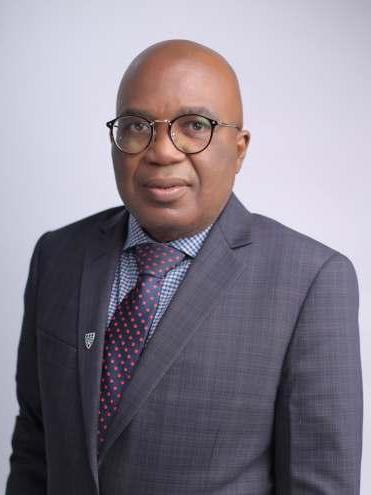
In uncertain times, organisations aim to achieve short-term survival and chart a course for long-term relevance. They can achieve these when the following three conditions are present: positive interpersonal relationships, collaboration between organisational participants, and leveraging all available organisational collective intelligence. Interpersonal relationship, which is the foundation of the other drivers, comes from leaders having the relevant soft skills including:
Communication: two-way, truthful, and neutral
Empathy
Ability to build trust and integrity
Build a climate that cares for employees, provides an opportunity for them to be part of the decision- making process, make them engaged, agile and resilient.
HR leaders are important in uncertain t i m e s b e c a u s e t h e y h e l p t h e organisation avoid pursuing shortterm survival to the point of harming long-term relevance. The productivity of human resources is central in achieving this HR leaders need a complexity mindset which accepts that in uncertain times, organisations need to be agile and adaptable to constantly changing success factors. This mindset helps them to play four major roles, namely: balancing, umpire, data acquisition plus management, and data and information sharing.
HR leaders play an active role in helping the organisation to manage the dilemma created by pursuing shortterm survival and long-term relevance simultaneously They gather data to allow all organisational participants to recognise the need to make tradeoffs to
optimise the two goals simultaneously for the organisation's good. For example, HR leaders ensure that before resorting to laying off or reducing pay/benefit, organisational participants know that this decision is the last resort after other less painful options have been considered.
HR leaders play the role of umpires to ensure that the needed collaboration between organisational leaders and employees is developed and sustained. They also keep the collaboration active in identifying and using organisational collective intelligence for short-term survival and long-term relevance. To effectively play this role, organisational participants must see HR leaders as credible.
HR leaders are like referees in sports. However, unlike referees, they are not there to identify defaulters to be punished, but to ensure that every organisational participant operates according to the rule of engagement that guarantees collaboration and the leveraging of all the collective intelligence in the organisation. They avoid being overtly tilted towards the organisation or employees, but they steer communication along a win-win course. In doing this, HR leaders ensure that appropriate emphasis is
Question to ponder:
As an
how do you facilitate collaboration between your organisation's leaders and employees?
placed on people, process, and profit, and that in arriving at this emphasis, every organisational participant is heard, understood, and cared for while
agreeing on ways to handle issues.
HR leaders achieve excellence through data gathering and information sharing t h a t f a c i l i t a t e discussions within the organisation –first within groups and then between groups. In a complex environment, it is only data that is relevant to current situations that drives success. It is the responsibility of HR l e a d e r s t o d r a w meaning from them and interpret them in a w a y t h a t i s b e n e f i c i a l t o t h e organisation.
Data and Information Sharing Role
HR leaders need data on employees' feelings in uncertain times, their level of engagement, agility and resilience, and their perception of organisational leaders. They need data on how leaders feel about employees, how they relate with them and the level of collaboration between leaders and employees To organise data in ways meaningful to organisational participants and to drive fruitful discussion, the HR leader must make HR analytics a central function in the department. This function can no longer be left to IT specialists who have no background in HR.
With the data, HR leaders facilitate discussion with leaders, and within employees prior to discussion between groups HR leaders ensure that all organisational participants have adequate information through data which will aid their individual and collective resolution of the main dilemma (short-term survival and long-term relevance) Hence, in uncertain times HR leaders need continuous acquisition and effective organisation of data.
Hence, HR leaders act as 'consultants' that continuously acquire or manage external data on leaders' skills and employee issues and use such data to facilitate meaningful and beneficial communication that achieves a common understanding of issues and the required win-win solution. This solution does not mean that every organisational participant gets what they want all the time, but that data provided will make employees aware of the discussions that led to any decision that demands sacrifice from them Most organisations acquire data yearly, but it may be beneficial to increase the frequency of data acquisition to p r o p e r l y c a p t u r e t r e n d s i n organisational behaviour.
Question to ponder: As an HR leader, how do you facilitate collaboration between your organisation's leaders and employees?
About the author
HR leader,
HR leaders are important in uncertain times because they help the organisation avoid pursuing short-term survival to the point of harming long-term relevance


The coronavirus, an invasive disease that has afflicted millions worldwide and caused over a hundred thousand deaths, has crippled millions of businesses, and presently threatens many more. This article puts forth the argument that sales is the lifeblood of every organisation and companies that best manage their sales functions, stand a good chance of surviving this pandemic (COVID-19) era. Sales is one of the key strategies for attaining competitive advantage and, ultimately, increasing the profitability of businesses (Pettijohn & Pettijohn, 1994), and this assertion has never been more accurate than in this season.
The spread of coronavirus has ruined most business activities, models, and strategic intents. Companies that will survive after the pandemic subsides are those who have demonstrated high degrees of innovation, creativity, and resilience. With closed offices, remote communication, health concerns, and challenges with suppliers and customers, it is only astute salespeople that can leverage
and turn this crisis into opportunities to scale up their profit. Hence, the salespeople and executive teams who are going to lead the charge to return companies to normalcy and eventual profitability will have to employ the 5Cs of Sales Excellence (see Figure 1 below) to enjoy continued sales success in the light of the global pandemic

The short to medium-term process must focus on sales stabilisation. This temporal process, which occurs between three to six months, focuses on the need to consult with identified stakeholders, compare sales targets, current and market opportunities- pre and post-pandemic era In the long term, sustained value realisation will be the goal, where the sales team must construct a new working environment that will deliver value-added services swiftly, capture lost markets and win new customers, especially in the light of a burgeoning digital era.
Consultation: This is the phase that involves in-depth discussions with employees and consumers during a crisis. In the course of the COVID-19 crisis, employees look forward to messages from employers, showing s o m e m e a s u r e o f e m p a t h y , encouragement and consideration
These employees desire to be carried along on the steps that the organisation is taking to ensure that their sales trajectory is not affected by the crisis. It is important for organisations to arm t h e e m p l o y e e s w i t h r e l e v a n t information and virtual tools necessary to improve their capabilities while the
crisis persists. Such tools expand the mental horizon of the employees and enable their confidence in the organisation to grow. They also become b e t t e r r e p r e s e n t a t i v e s o f t h e organisation such that its values begin to align with theirs (Mazzei & Ravazzani, 2011).
Comparison: During the COVID-19 crisis, organisations need to develop n e w s t r a t e g i e s t o h a n d l e n e w challenges. One way this can be achieved is by comparing what obtained before (pre-COVID) to what is and using the knowledge of that as leverage to come up with innovative ideas on strategies and tactics to be deployed after the crisis. An awareness of this will enable the organisation to cater better for the customer, thus extending the potential for increased loyalty and patronage (Helm & Tolsdorf, 2013).
Construction: Crisis situations have a way of halting the present structure of organisational framings; hence, the importance of adequate and wellthought-out constructive processes Effective and efficient organisational teams must be formed and tasked with implementable tasks that curb the negative effects of the crisis on the

profit margin of the organisation (Cefis, Bartoloni & Bonati, 2020). Flexibility must be embraced at this point, especially since there are uncertainties as to how and when the crisis will end. Marketing strategies that can align with, function, and accommodate the current crisis should be developed and implemented with speed and accuracy.
Captivation: Traditional and new media become an important tool for bridging the gap between organisations and the customer base Organisations have the responsibility to communicate how they are responding to the crisis. They need to creatively construct their messages in ways that they are not perceived as self-serving, but as authentically concerned for the well-being of the wider environment and the community where they are domiciled. Another way to capture customer attention is to create online feedback mechanisms through which they can freely communicate with the organisation. Digital communication strategy becomes of importance, as it helps the organisation communicate via a medium that is gradually being generally accepted into the global society (Kim & Choi, 2018).
Capture: This phase accounts for the presence of competition (Afthonidis & Tsiotras, 2014), i.e. how to weaken the competition and retrieve all lost markets. Through market-based research, organisations should employ the use of artificial intelligence and machine learning to improve sales. The sales team has to learn to use digital technology to understand the evolving market developments, and how best to carve a niche to win back lost customers and increase market share.
Summary
Organisations hoping to minimise losses or creatively take advantage of the COVID-19 pandemic will not only prioritise the well-being and health of their employees but also ensure that the marketing team optimally utilise their skills during and after the pandemic. It is, therefore, important that they reach out to potential and current customers through digital marketing and creative selling techniques. Consequently, organisations will have to rely more on corporate social responsibility (CSR) by moving from salesdriven brand messages to general concern messages that will appeal to the rationality of potential and current customers. Thus, organisations need to develop strategic plans to keep in touch with customers and keep them informed about future plans while assuring them that temporary setback will end, and business will return to normal.
By utilising the 5Cs of Sales Excellence, organisations can mitigate the challenges posed by the pandemic, attract new customers, win back old customers and generally, create superior value, in the long term. An effective customer engagement strategy will leverage digital marketing strategies and other creative tactics to thrive in a new economy that will emerge post-COVID 19..
Afthonidis, E.P. and Tsiotras, G.D., 2014. Strategies for business excellence under an economic crisis. The TQM Journal.
Cefis, E., Bartoloni, E. and Bonati, M., 2020. Show me how to live: Firms' financial conditions and innovation during the crisis. Structural Change and Economic Dynamics, 52, pp.63-81.
Helm, S. and Tolsdorf, J., 2013. How does corporate reputation affect customer loyalty in a corporate crisis? Journal of Contingencies and Crisis Management, 21(3), pp.144-152.
Kim, S. and Choi, S.M., 2018. Congruence effects in postcrisis CSR communication: The mediating role of attribution of corporate motives. Journal of Business Ethics, 153(2), pp.447-463.
Mazzei, A. and Ravazzani, S., 2011. Manager-employee communication during a crisis: the missing link Corporate Communications: An International Journal, 16(3), pp.243-254.
Pettijohn, L. & Pettijohn C. E. (1994). Retail Sales Training – Practices and Prescriptions Journal of Services Marketing, 8(3), 17-26.
About the author
Dr Okechukwu Amah teaches Organisational Behaviour and Management Communication at Lagos Business School.

Rosemary Ihuoma is the Principal Consultant for ProDx ProDX – a training management software solution for corporate organisations. She is an alumna of the Executive MBA (EMBA 16) She can be reached for c o m m e n t s & r e q u e s t s a t support@prodx.org
No one can claim to have all the answers to the current crisis the world is facing. However, we can support one another by sharing helpful insights on possible solutions to the negative effects of the crisis on ourselves and our businesses.
Here are a few takeaways:
A crisis situation should not take over the objectives of a business though it may necessitate its modification. If you have to review your business objectives, be intentional about it. As you make your plans, ensure that your goals and target audience and all stakeholders (internal and external) are kept constantly in view. Among other things, doing this will make certain that your plans are more unique.
Crisis calls for a great deal of flexibility i n m a n y a r e a s o f b u s i n e s s management. It is good to review your working policies (remote and physical) – sick leave, annual leave, maternity leave, performance, training, payment. Even as you naturally “self – protect”, be sure to conduct a review that clearly lets your people and clients know you are thinking about their wellbeing during this time of crisis. This will go a long way to engender structured trust,
loyalty and commitment. These are invaluable in business.
Communicate
Now more than ever before, you need to communicate Ensure that all your employees are in the loop and are all well informed. The COVID-19 pandemic just like any crisis has created a lot of uncertainties, disrupting business plans and strategies and causing anxiety Consequently, regular communication with your team to keep them consistently informed is one sure way to reduce their uncertainties and manage their anxiety.
Train
Furthermore, providing your people with relevant training will help to direct their attention to achievements and create a sense of fulfilment which is threatened by the crisis. In turn, this will help to keep your people focused and enhance their performance in driving your business goals (studies have shown this) Having a good training management software solution is a great help here. It enables you to train your people regularly, store your own training content and access other training content cheaply. A training management solution is a very essential digital transformation tool for every business in these times, it saves your time and money.
Secure
It is important that while you look to technology to continue your business operations, you must not forget the need to secure and centralise your business information and data. In this age of data mining, there is a need to carefully access the privacy and data security afforded by most of the digital solutions you use in business for live meetings and/or conferencing It is always better and more advisable to have your own integrated training management software solution so that your content is centralised, it guarantees you access control and maximum data security.
Conclusively, as a business leader or manager, it is true that you cannot provide a complete solution to every problem - especially in the case of a novel crisis as the coronavirus pandemic However, your objectivity, empathy, are strong traits that should come through in all your choices, decisions and actions in preparation for the future. These, at the end, are what would matter most in your business and precisely what your people will remember long after the crisis is gone. A crisis always has an end, while your business is a going concern.


Afew persons have been concerned about the possibility of the current #ENDSARS movement in Nigeria being hijacked by hoodlums. Personally, I differ from this line of thought. As Nigerians we have lived in a comfort zone of pain for so long that it is so difficult for us to even tolerate any small discomfort EVEN WHEN EVERY EVIDENCE POINTS TO THE FACT THAT THE DISCOMFORT WE ARE EXPERIENCING IS THE ROAD TO A GREATER DESTINY.

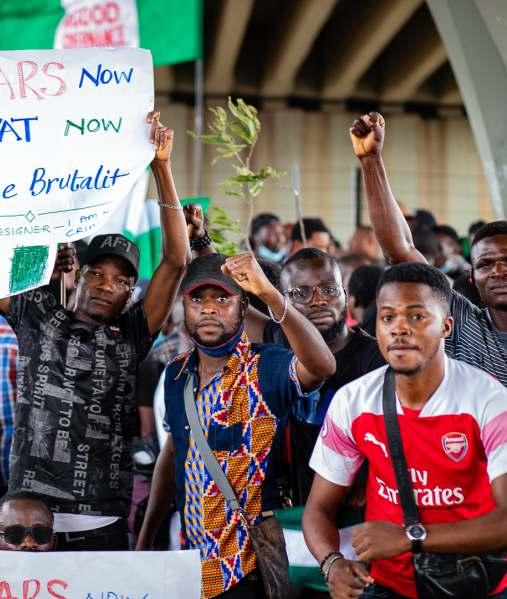
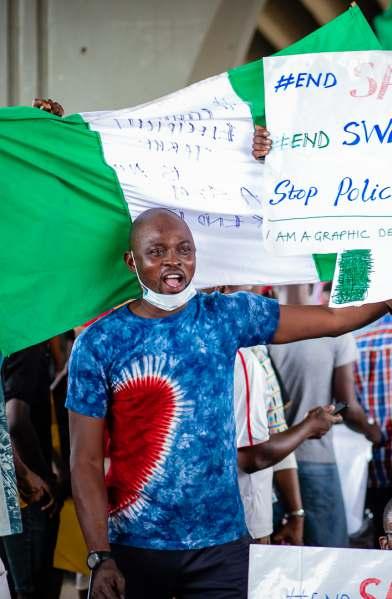
As humans, we abhor discomfort. In Biblical times, when the children of Israel knew for certainty that Moses was taking them out of slavery, they still told Moses that they would rather stay in Egypt and endure the known experiences under the Egyptian taskmasters They embraced the fear of the unknown, seeing it as a greater force than the promise of freedom & independence. Yet, if we can learn to embrace discomfort, it is the best thing that can happen to us: as individuals, as organisations, as a nation.
DISCOMFORT is the feeling you get when a woman is about to give birth. It signifies that the child has outgrown the mother's womb. The feeling of discomfort is palpable, but the knowledge of the miracle of a new life sustains the mother's confidence in the face of the discomfort. The activities of hoodlums cannot disrupt the emergence of a new Nigeria. We need to be focused on the goal. The pains are real, the discomfort certain, our vulnerabilities, even surer. But as the statement by Marcia Reynolds highlights above, it is when you are vulnerable that RADICAL CHANGE happens There is nothing new in hoodlums taking advantage of our protests The Government has the responsibility to protect all properties, lives, and citizens, including the lives of protesters as the right to express dissent is a constitutional right.
When one has been enslaved for over 60 years, it is difficult to remember the sweetness of freedom, and it is this vulnerability that hoodlums seek to exploit. We have seen prisoners who returned to prisons after breaking out of prison, because of the fear of being in the outside world, even when free. We are at a vulnerable moment, but it is a moment that we should LEAN INTO rather than avoid. There is a lot of work needed to unlearn the old, long-lived awareness and solidify a new one, to take us to greater heights.
Tunde Ekpekurede is an authority in the fields of mental toughness and resilience and has served as speaker, facilitator, and executive coach in these fields for over a decade. He has worked in executive level positions in the Republic of Ireland, Northern Ireland, England, and Nigeria. He is currently the CEO of Learning4Living, a Training and Leadership Development company. He is a member of the Advanced Management Programme (AMP) 12.
postulations that were not 100% certain. All growth happens outside of your comfort zone. You can either be comfortable and stagnate or stretch yourself — become uncomfortable — and grow.
Change happens when we explore things that make us uncomfortable. We embrace moments that open us to new possibilities. Fear tries to keep us the same. Fear is a form of paralysis – It says DON'T MOVE. “The comfort zone is a psychological state in which one feels familiar, safe, at ease, and secure. You never change your life until you step out of your comfort zone; change begins at the end of your comfort zone.” Roy T. Bennett.
“Until we allow ourselves to see discomfort as the agent of change it is, we live in fear” – Brianna Wiest.
But this generation of Nigerians will not cower in fear. Former US President John F. Kennedy said, “We choose to go to the moon.
We choose to go to the moon in this decade and do the other things, not because they are easy, but because they are hard, because that goal will organise and measure the best of our energies and skills, because that challenge is one that we are willing to accept, one we are unwilling to postpone, and one which we intend to win, and the others, too”.
When a young baby begins to learn how to walk for the first time, the experience is scary. At this moment we are like little babies, learning to take little steps. There is so much that is unknown and so much that is scary. But that is the joy of what we are embarking upon.
Christopher Columbus and others like
him set out several years ago to explore territories that they were not even sure e x i s t e d T h e c i v i l i z a t i o n a n d technologies that we enjoy today came out of the sweat of people who dared to venture into the unknown. Think about the first people who agreed to board a plane, a rocket and all that - putting their lives forward for scientific
 Akin Akinbogun
Akin Akinbogun
Tragedy of the Commons sounds like something out of Broadway where millions of lights on theatre marquees and billboard advertisements help brighten the night sky and echoes of musical burletta rent the air.
But hold that thought!
The concept has a much deeper connotation and impact on our everyday lives and may provide some insight into some of the social and environmental problems that have besieged many generations. Tragedy of the Commons is an economic problem that occurs when individuals neglect the well-being of the society in pursuit of personal gains.
How does this relate to anything then? You may want to ask.
The tragedy of the Commons is an economic problem in which every individual has an incentive to consume a resource at the expense of every other individual with no way to exclude anyone from consuming.
It results in overconsumption, underinvestment, and ultimately depletion of a common-pool of resources. As the demand for the resource overwhelms the supply, every individual who consumes an additional unit directly harms others who can no longer enjoy the benefits. Generally, the resource of interest is easily available to all individuals.
The concept highlights the conflict between individual and collective rationality and it is taken from the title of a scientific article written by Garret Hardin (an evolutionary biologist by education) in 1968. The paper addressed the growing concern of overpopulation, and Hardin used an example of sheep grazing land, taken from the early English economist William Forster Lloyd when describing the adverse effect of overpopulation.
Hardin was concerned with human population growth and the inevitable environmental degradation resulting from overpopulation.
He compared shared resources to a common grazing pasture; in this scenario, everyone with rights to the pasture, graze as many animals as possible, acting in selfinterest for the greatest short-term personal gain Eventually, they use up all the grass in the pasture; the shared resource is depleted and no longer useful.
The Tragedy of the Commons is an accurate description of human nature; we will always opt for an immediate benefit at the expense of less tangible values, such as the availability of a resource to future generations.
For more clarity on the definition of the concept, the following will provide more insight:
-"Commons" in this sense means such resources as atmosphere, oceans, rivers, fish stocks, the office refrigerator, energy or any other shared resource which is not formally regulated; not common land in its agricultural sense.
Akin Akingbogun is the head of Retail Engineering at OVH Energy Marketing and President of SMP 69 class. Also known as the "Duke of Small talks", Akin is a public speaker, social entrepreneur and writer Akin's writing can be found at www.akinakingbogun.com

- Hardin used the word “tragedy”, to refer to a dramatic outcome that is the inevitable but unplanned result of a character’s actions He called the destruction of the commons through overuse a tragedy not because it is sad, but because it is the inevitable result of shared use of the pasture. Freedom in a commons brings ruin to all
The tragedy of the commons may occur when an economic good is both rivalrous in consumption and nonexcludable. These types of goods are called common-pool resource goods (as opposed to private goods, club goods, or public goods).
A good that is rivalrous in consumption means that when someone consumes a unit of the good, then that unit is no longer available for others to consume; all consumers are rivals competing for t h e g o o d , a n d e a c h p e r s o n ' s consumption subtracts from the total stock of the good available.
Hardin pointed out the problem of individuals acting in rational selfinterest by claiming that if all members in a group used common resources for their own gain and with no regard for others, all resources would still eventually be depleted.
Hardin's essay asserted, without proof, that human beings are helpless prisoners of biology and the market. Unless restrained, we will inevitably d e s t r o y o u r c o m m u n i t i e s a n d environment for a few extra pennies of profit. There is nothing we can do to make the world better or more just.
Overall, Hardin argues against relying on conscience as a means of policing commons, suggesting that this favours selfish individuals – often known as free riders – over those who are more altruistic. In avoiding over-exploitation o f c o m m o n r e s o u r c e s , H a r d i n concludes by restating Hegel's maxim (which was quoted by Engels), "freedom is the recognition of necessity." He suggests that "freedom" completes the tragedy of the common. In furtherance to Hardin's position, history also illustrates that the destruction of the commons will not be stopped by shame, moral admonitions, or cultural mores anywhere near so effectively as it will be by the will of the people expressed as a protective mandate; in other words, government.
Tragedies of the Commons are real, but not inevitable Hardin proposed government intervention, regulation, privatisation or direct control of the common-pool resource to avert the “tragedy”. He concludes that regulating consumption and use or legally excluding some individuals, can reduce over-consumption and government investment in conservation and renewal of the resource can help prevent its depletion.
So let's look at examples of the Tragedy of the Commons:
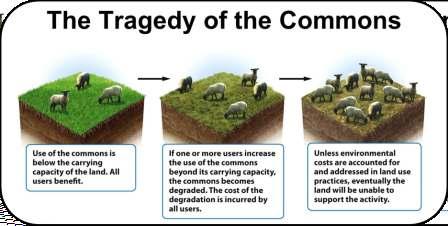
S o m e s c i e n t i s t s c o n s i d e r t h e exponential growth of the human population to be an example of a Tragedy of the Commons. In this case, the common resource is the planet earth and all its shared resources. The world's population has reached 7 billion.
Examining population growth as a Tragedy of the Commons illustrates t h a t t h e d e p l e t i o n o f c o m m o n resources isn't always the result of greed. Just by existing, each person uses water, air, land, and food resources; splitting those resources among 7 billion people (and counting) tends to stretch them pretty thin.
To bring this closer home, think about the COVID-19 pandemic. People rushed in panic to buy all sorts of essentials and nonessentials leaving stores out of hand sanitizers, disinfectant wipes and basic food items. Shoppers bought as much as they could and much more than they would ever need. Stores' shelves turned bare and looked like a hurricane swept through as shoppers emptied almost all items.
There were reported (and even recorded) incidences of people trading invectives as others packed essential goods while some settled this with fisticuffs. Basically in an attempt to ensure their own comfort and safety, individuals quickly depleted limited supplies of resources. That chaos brings the Tragedy of the Commons right into our faces.
Traffic congestion: Public roads are an excellent example of common property shared by many people. Each of these people has his or her own interest in mind — typically, how to get to work as quickly and easily as possible. But when everyone decides that public roads are the best way to meet traveling needs, the roads jam up and slow down overall traffic movement, filling the air with pollutants from idling cars.
Turning public roads into private roads or toll roads creates a different scenario. With a toll to pay (especially if
the toll is higher during peak-use hours such as rush hour), drivers may consider a less-direct route or choose to drive to work at a different time
Water: Water pollution, water crisis of over-extraction of groundwater and wasting water due to overirrigation.
In the wake of the civil disobedience and unrest that followed the #EndSARS protests in Lagos, the vandalising of stores and pillaging of COVID-19 p a l l i a t i v e s f r o m g o v e r n m e n t warehouses around the country echoes the adverse effect of the Tragedy of the Commons.
are primarily received by one party, while the costs are spread out over many parties.
For a Tragedy of the Commons to occur, the goods must also be scarce, since a non-scarce good cannot be rivalrous in consumption; by definition, there is always plenty to go around and non-excludable.
Goods that are non-excludable means that individual consumers cannot prevent others from also consuming the goods It is this combination of properties (scarcity, rivalry in consumption, and non-excludability) that creates the Tragedy of the Commons.
Each consumer maximises the value they get from the good by consuming as much as they can and as fast as they can before others deplete the resources, and no one has an incentive to reinvest in maintaining or reproducing the good since they cannot prevent others from appropriating the value of the investment by consuming the p r o d u c t f o r t h e m s e l v e s . Eventually, the good becomes more scarce and may end up entirely depleted.
privatising health care and other social services, giving corporations 'tradable permits' to pollute the air and water, and much more.
It's shocking to realise that he provided no evidence at all to support his sweeping conclusions. He claimed that the “tragedy” was inevitable — but he didn't show that it had happened even once.
Hardin simply ignored what actually happens in real commons: selfregulation by the communities involved. He offered no justification for his opinion that privatisation would save it. The implication is that private owners will do a better job of caring for the environment because they want to preserve the value of their assets.
Solutions to the Tragedy of the Commons include the imposition of private property rights, government regulation, or the development of a collective action arrangement.
For example, government regulation can set limits on how many cattle may be grazed on government lands or issue fish catch quotas. However, top-down government solutions tend to suffer from the well-known rent-seeking, principal-agent, and knowledge problems that are inherent in economic central planning and politically driven processes.
Institutionally, this depends on developing some mechanism to define and enforce private property rights, which might occur as an outgrowth of existing institutions of private property over other types of goods.
Technologically it means developing some way to identify, measure, and mark units or parcels of the common pool resource off into private holdings, such as branding maverick cattle.
awash with conflicts that justify Hardin's thoughts as stated in the Tragedy of the Commons. Over the last few decades in the history of many African states, unrestricted access to mining of mineral resources, such as crude oil in the Niger-delta wetland of Southern Nigeria, has caused untold h a r d s h i p a n d d a m a g e s t o t h e environment causing massive loss of farmland and contamination of aquatic marine; thus denying the future indigenes a sustainable source of livelihood. Unfortunately, this has gone unabated for too long and despite media expositions and outcry, the clean-up has been more on paper.
Other examples include: Air Pollution whether ambient air polluted by industrial emissions and cars among other sources of air pollution, or indoor air.
Forests – Frontier logging of old growth forest and slash and burn.
Animals – Habitat destruction and poaching leading to the Holocene mass extinction.
Oceans – Overfishing.
These examples reinforce the position where utility maximising (whether forcefully or not) behaviour of few individuals ruins the common for all. It occurs in any situation where benefits
Free market capitalism teaches us how to better our lives and those of other people by reaching out and taking, and by d o i n g s o m o r e e f f i c i e n t l y a n d productively Capitalism is, however, very bad at teaching us when to refrain from taking. That part does not form part of the free market system.
Capitalism may contribute a large part of human welfare and progress, but it cannot do so without some external constraints.
Hardin's essay has been widely used as an ideological response to antiimperialist movements in the Third W o r l d a n d d i s c o n t e n t a m o n g indigenous and other oppressed people everywhere in the world.
It has been used repeatedly to justify stealing indigenous peoples' lands,
A critical aspect to understanding and overcoming the Tragedy of the Commons is the role that institutional and technological factors play in the rivalry and excludability of resources. Human societies have evolved many varied methods of dividing up and enforcing exclusive rights to economic goods and natural resources or punishing those who over-consume common resources over the course of history.
One possible solution is top-down government regulation or direct control of a common-pool resource. Regulating consumption and use, or legally excluding some individuals, can r e d u c e o v e r c o n s u m p t i o n a n d g o v e r n m e n t i n v e s t m e n t i n conservation and renewal of the resource can help prevent its depletion.
This solution can suffer from some of the same problems as top-down government control, because t often, this process of privatisation has occurred by way of a government forcibly assuming control over a common-pool resource and then assigning private property rights over the resource to its subjects based on a sale price or simple political favour.
Collective action can be useful in situations where technical or natural physical challenges prevent convenient division of a common-pool resource into small private parcels, by instead relying on measures to address the goods rivalry in consumption by regulating consumption This also involves limiting access to the resource to only those who are parties to the collective action arrangement, effectively converting a common pool resource into a kind of exclusive good.
Bringing this home, our society is sadly
This is the same with fishing in the water bodies within the territory of the country Without recourse to the s e a s o n s a n d b r e e d i n g c y c l e s , fishermen have trawled the waters every day uncontrolled yet over-fishing and selling all sorts of fishes not bred or suitable for consumption.
For as long as these pillages and looting continue, Hardin has made it succinctly clear that the depletion of common resources is inevitable. Is this when the import of the Tragedy of the Commons will be appreciated? Well, give this some thought.
One thing is clear though, collaborative effort is key to the sustainable m a n a g e m e n t o f o u r c o m m o n resources. Balancing concern for the well-being and interest of individuals with concern for the wellbeing of the group and of the shared environment will create long-term outcomes for everyone.
We must rethink our approach to managing our resources in Africa, especially Nigeria.

Psychological safety is the belief that one will not be criticised, punished, treated unfairly, or humiliated for s p e a k i n g u p w i t h o n e ' s i d e a s , questions, concerns, or opinions. One understands that ideas expressed may not be endorsed, bought into or applauded but will be considered and valuable. It is an environment where there are no repercussions if your opinion differs from that of 'the Boss'.
When psychological safety is absent, communicating with colleagues and superiors can feel as if you are navigating landmines Employees simply do not know what actions or words may trigger an explosion. As a result, it is considered safer and less risky to refrain from speaking - even when it matters than risk an explosion. S u c h a s c e n a r i o h a m p e r s communication and creativity – and discourages feedback.
Rather than focus energy on the common goal for the greater good, employees spend time tiptoeing around
assumed landmines, avoiding crucial conversations and interpreting behaviours and actions – rather than c l a r i f y i n g . T h i s p r o m o t e s ineffectiveness and inefficiency.
H o w c a n w e c u l t i v a t e a w o r k environment that enhances learning, candour and effectiveness? Here are some ideas:
Inclusion Safety – enhance the onboarding process to ensure/allow new employees settle in seamlessly and have a sense of belonging.
Learner Safety – promote a corporate culture where people feel comfortable to ask questions, receive feedback, experiment, and own up to their mistakes.
Contributor Safety – explain the 'why', assign the 'what' and delegate the 'how'. Provide autonomy and guidance in exchange for results
Challenger Safety – leaders need to master how to increase intellectual friction (idea collision, debate, constructive dissent) yet reduce social friction that may arise.
As the movie '300' ends, we find that despite a history of being formidable in battle, the Spartans lost to the Persians Something Leonidas was forewarned but failed to heed.

Your company may not 'die', but it will not live up to its full potential if leaders do not 'heed' and deliberately cultivate an enabling environment for the unfettered flow of information. It is simple to implement but has its challenges It demands leadership c o m m i t m e n t , r e c r u i t m e n t attentiveness, culture alignment and continuous coaching.
 Tomie Balogun
Tomie Balogun
About the Author:
Akanimo Ekong is currently the Founder and Managing Director of Candor Consulting Ltd, an adaptive and authentic Business Consulting firm providing training, employee wellbeing, culture alignment, performance management and IT outsourcing services. Akanimo is a serial trainer, leadership coach, expert recruiter, and mental health counsellor. He is currently the President of EMBA-3. Connect with Akanimo on LBS Connect, LinkedIn or ;akanimo@candor.ng www.candor.ng

‘' I'm not sure I understand why I need to think about my pension now, '' she asked ''I am a final year student looking forward to graduating and earning an income in a few months. This is all I am thinking about right now. Can you please explain why thinking about my pension is important? ''
This was at an event in one of the Universities in Nigeria. I was one of the speakers on the panel, and each of the panelists had shared their personal s t o r i e s o n f i n a n c i a l l i t e r a c y , e n t r e p r e n e u r s h i p , c a r e e r development. The stories we shared inspired questions and this was one of the interesting ones.
As I listened to this student speak, I thought her question was typical of the way my generation thinks I also thought it was a valid question, as she honestly wanted to understand why she should think about a future that was 4050 years away when she has dreams and aspirations for a shorter time period.
The other members of the panel and I did our best to provide answers to this young lady on why it wasn't too early to start thinking about mastering money management, and why she needed to seize the opportunity to learn as much as she could from all the members of the panel.
However, for some reason, that
question stayed with me. Questions like this might seem unimportant next to the wave of overwhelming information on financial literacy accessible on the internet.
Yet, sitting on a panel with other professionals and experts on a rainy day in the south-south area of Nigeria, I realized that questions like that help us get into the minds of the current generation of millennial investors in Nigeria and possibly Africa.
Let's get into their minds, shall we?
An estimated 50% of the current population in Nigeria are aged 30 or less This group consists largely of millennials who were born between the y e a r s 1 9 8 1 - 2 0 0 0 . A c c o r d i n g t o
behavioural experts, millennials are incredibly sophisticated, technology wise. They are also immune to most traditional marketing and sales pitches as they not only grew up with it all, they have seen it all, and have been exposed to it all since early childhood. They are also less brand loyal as the speed of the Internet and influence of social media make them super flexible in fashion, styleconsciousnessandtravel
Prior to the tour of 5 universities, I carried out a survey on 200+ final year students of a university in Lagos and I found the answers to the survey very interesting. When asked the question, “Have you considered investing before?” 90% of respondents selected the option, “I have considered investing, but I do not invest because I do not understand how it works”.
Digging further, it became clear that a lack of information was not the problem. If they really cared to learn about investing, they could simply search the internet for information. I did a google search on how to invest in Nigeria and the search engine brought up 36 million results. So, the problem is not a lack of information The problem is they don't see how all the overwhelming information can directly help them achieve their lifestyle goals.
Over a period of 2-3 years, I have worked with 4000+ young millennials in Africa who read my weekly emails, attend my investment workshops or read my recently published book on investment clubs, and the rhetoric is similar. On the recent campus tour with Pensions
Alliance Limited, I had the opportunity to speak to at least 10,000 students in 5 universities across Nigeria, and after each event, quite a number of the students filled my inbox with the same questions: How can investing help me achieve my goals? How can I start investing right away? They say I don't really think about retirement because it seems a long way off in the future. Talk to me about financial freedom instead. How can I work, save and travel the world on a budget? How can I pay my bills and still chill? How can I own a house in my 30s and not have to wait till my kids are all grown up? How can I tick off all the
interests? How do I build a business that increases my net-worth? Can you help me achieve this or am I just a statistic for your organization's bottom line?
I believe this was that student's heartfelt question to the members of the panel: how can you help me achieve my financial goals so I can live life on my own terms?
How should this question change the current financial landscape?
The current financial landscape consists of core financial institutions that are innovative with digital technology and some who are largely playing catch up with the industry leaders. We also have a new crop of digital players gaining incredible ground on the local financial landscape in A f r i c a a n d g i v i n g t h e i n c u m b e n t s a r u n f o r customers However, the question remains, are they all doing enough? The millennial investor doesn't simply want to be a performance index on an o r g a n i z a t i o n ' s f i n a n c i a l statement. They want financial products that help them achieve their lifestyle goals and educate them on how best to achieve financial freedom.
prevailing inflation rate.
Over the past decade, we have seen the traditional financial industry disrupted by multiple technology companies in more developed economies. The use of smart phones for investing services by companies like Betterment, Wealth front, Stash, Acorn in the USA are great examples of how technology is helping millennials move from traditional institutions to digital institutions. These digital institutions offer a simple platform to invest money conveniently in investment options that millennials care about.
In Africa, we have seen significant g r o w t h i n t e c h n o l o g y e n a b l e d
industries such as mobile banking and the payments industry. We see this in Nigeria as well, with applications like Piggybank ng offering automated money saving features and i-invest.ng offering lower price points for millennials to invest in treasury bills. However, we need more of them speaking the millennial language. The millennial language is YOLO (you only live once) and FOMO (fear of missing out). Our lives need to be lit with squad goals i.e. we want to do what our friends are doing, so even if you throw shade, we'll be fine.
Millennials in Africa want a balance: a good mix of short-term interesting investing products and long-term options We won't mind considering
what happens in 40 years as long as we don't miss out on the joys of the present. We love our squad of friends, so we'll collaborate to achieve our goals in a hurry. We want our lives to be lit sometimes, so give us a good outing while you teach us about making responsible money decisions.
Basically, speak our language and show us the path to financial freedom so we can hear you loud and clear.
For me, the best part of the campus tour was confirming how different millennials are, in terms of tribe and geographic location, yet how similar we are in terms of our financial language and needs. I am glad I got to experience
plans on my bucket list? How can I earn passive income? How do I build an investment portfolio that captures my passion for impact, tech, or any other
I f i n d m y s e l f i n c r e d i b l y impatient with traditional marketing pitches to simply open a bank account with another financial institution. I own 5 bank accounts, most of which were opened to do an account officer a favour. At first, it seems like a good idea, but after a while, you realise all they need you to do is simply open the bank account and stack up cash to earn interest below the
About the Author
Tomie Balogun is an Investment Expert and a leader within the financial education space in Africa. With over a decade's worth of experience across management consulting, telecommunications and value-added technology, she contributes her technical expertise and extensive experience to creating Fintech products and helping SMEs raise funding in Africa. She is the Founder and current CEO of Vestract, a financial education and technology company that provides financial education to millennials in Africa through the Green Investment club, (Nigeria's biggest investment club) and connects them to vetted investment opportunities through Twelvevest, a Fintech platform She holds a bachelor's degree in Economics, a Master of Business Administration (MBA) degree from Lagos Business School and is an alumna of the Harvard Fintech program.

Millennials in Africa want a balance: a good mix of short-term interesting investing products and long-term options. We won't mind considering what happens in 40 years as long as we don't miss out on the joys of the present
Over a period of 2-3 years, I have worked with 4000+ young millennials in Africa who read my weekly emails, attend my investment workshops or read my recently published book on investment clubs, and the rhetoric is similar.
background.
After spending 5 years in the c a p i t a l m a r k e t s , M a r t h a Omamegbe sought a fresh challenge. Recognising her interest in entrepreneurship and inspired by the carriage and work ethics of her Mentor and Direct Manager at that time, both alumni members of Lagos Business School, she applied for the Executive MBA (EMBA) programme at Lagos Business School and was admitted into the EMBA 22 class in 2017.
Described by her friends as quiet and reserved, Martha chose her permanent seat next to her friend, Chioma Unbeknownst to her, a young man named Ugbede Ibrahim also chose a spot behind them.

With more than 75 participants admitted into the programme, the class was split into two (A & B) to enhance the learning & networking experience. Martha found herself in the EMBA 22B class, while Ibrahim was in EMBA 22A class. As the programme progressed, the two exchanged pleasantries each time they crossed paths when the EMBA A & B classes had joint sessions.
Ibrahim was a pharmacist working for a multinational firm based in Dubai with its African base in Abuja. As strategy and management skills became increasingly more required for his role, he decided to opt for an MBA and considered Saïd Business School at the University of Oxford, England. However, he could not find the time to take off work and move to England for the course. He realized that he could get the same world-class education at LBS
and applied for the EMBA course. (In hindsight, Ibrahim now appreciates his choice even more, noting the relevance of the LBS experience in the African context).
Opting for the exchange programme at IESE Business School, the two coincidentally booked the same Emirates flight to Barcelona, Spain Upon settling in, they were neighbours, another coincidence. Martha was living with her cousin, Ono, who they both discovered to be a mutual link between them; she was Ibrahim's very good
friend and classmate in EMBA 22A class. It was during the trip Ibrahim noted Martha's humble, peaceful & calm disposition; her humanity and passion for advocacy; traits that Ibrahim admired and sought in people he could consider as close friends.
Based in Abuja, Ibrahim would travel to Lagos for the programme which was usually scheduled for weekends. However, in 2019, when classes were done, he also made work trips to Lagos and found time to visit his new classmates & friends. On one of such
trips, Ibrahim decided to call Martha to ask if they could hang out while he was in town. Although Martha was happy to hear this, she was caught up with an official in-house training in Satellite town and could not come out to see him. Undeterred, Ibrahim, who was not used to that area of Lagos, found his way to the training centre to see her. This was the beginning of a closer friendship and as time went by, Ibrahim would meet up with her on different occasions with her friends and family.
As their responsibilities grew and demanded more attention from them, the pair kept less in touch, sending each o t h e r m e s s a g e s o n d i f f e r e n t milestones. However, an opportunity came for them to meet again, this time in Abuja. Martha took some days off work to travel to care for her friend who was in the hospital. She decided to check on Ibrahim and called, informing him that she was in town. He came to the hospital to see her, got her lunch and offered her a ride back to where she stayed. Throughout her stay, Ibrahim graciously picked her from the hospital in the evenings and dropped her at the airport on her way back to Lagos During these trips, the pair got closer and found that they shared similarities in their life perspectives and family
During the send forth dinner organised for their class in November 2019, the pair agreed to attend and celebrate the end of their programme with their fellow classmates. Not too long after, Ibrahim mustered up the courage to ask her for a relationship that would lead to marriage. Martha hesitated; it was unexpected, and she needed time to think about it. For their graduation in December, they also made plans to celebrate together with friends and f a m i l y A f t e r t h e i r g r a d u a t i o n ceremony, Ibrahim asked her again. M a r t h a t h o u g h t a b o u t t h e i r conversations, his character & personality. She took into cognizance the fact that two of them had passed through a one-of-a-kind grooming experience at LBS, one she believed can never leave anyone the same after it. She knew she wanted to be with someone who was self-driven and of like mind to grow with; Martha accepted Ibrahim's proposal.
Ibrahim and his family planned their visit to Martha's family during Christmas of the same year, only to discover that Ibrahim's hometown, Idah in Kogi State, is a ten-minute boat ride across the River Niger to Agenebode, Edo State, Martha's hometown! It was a remarkable coincidence.
Upon meeting her parents, Ibrahim's proposal was heartily accepted, as he impressed them with his values and background. But the story did not stop there, Ibrahim still surprised Martha with a romantic proposal on Valentine's Day, 2020. As the pandemic began in Nigeria, the couple slowed their wedding plans until there was an ease in the lock-down.
On Friday, August 21, 2020, some of the couple's classmates found their way to Agenebode in preparation of the wedding ceremony. By the next day, the hashtag #LoveMadeinLBS started to trend on the WhatsApp platform of LBS A l u m n i A s s o c i a t i o n ' s ( L B S A A ) Governing Council, thanks to the EMBA 22 class president, Efosa Aigbe. The governing council made up of LBS Dean, President of the LBSAA, other Executive members and all LBSAA class presidents, was excited for the couple, congratulating the couple and the class.


The story that started as a journey of self-development, culminated into a beautiful union based on shared values a n d a l i f e - c h a n g i n g l e a r n i n g experience at LBS. Now a new story begins… and this time, the road will be travelled not by one, but by two-inone….
Congratulations Ibrahim & Martha!Amidst the heart-dampening events that shaped most of this year, a story of friendship, discovery & love emerges…












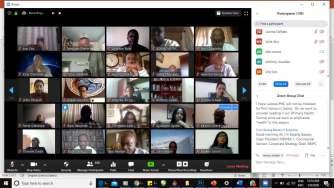






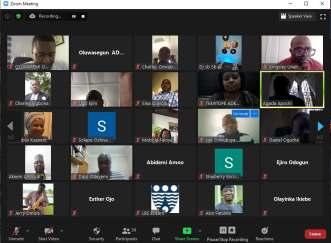
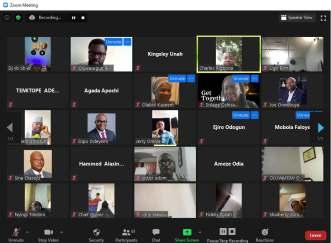
AMP 24
Ijeoma Okoro is named among five women leading the fight against Polio in the world
The Global Polio Eradication Initiative (GPEI) has named Ijeoma Okoro as one of five rotary women leading the fight against Polio globally. GPEI is the largest international public health initiative in history dedicated to the eradication of the Polio disease. It began in 1987 with a campaign by Rotary International, an international service organisation whose stated purpose is to bring together business and professional leaders in order to provide humanitarian service and to advance goodwill and peace around the world.
Okoro is a very active member of the Rotary club of Port Harcourt, where she directs the “End Polio Now” activities throughout sub-Saharan Africa. She has received several awards for her work with Rotary International including Best Rotarian of the Rotary Club of Port Harcourt for 3 separate years; Four Avenues of Service Citation for Individual Rotarians; Society award for Exemplary Leadership (2014) and a stone raised in her honour at the Paul Harris Memorial Walkway in Chicago, USA. She has been the Port Harcourt club president, district treasurer, chair of several committees, assistant governor, governor, and district trainer for districts over the years. She was recently appointed as the Endowment/Major gift adviser for a region (2021 -2024).
She is a Fellow of the Nigerian Institute of Corporate Administration (NCIA) and the Institute of Management Consultants. She is a member of Port Harcourt Chamber of Commerce & Industry Mines & Agriculture (PHACCIMA) and Port Harcourt Club. She is also an active member of Mater Misericordea Catholic Church and a Knight of St. John International (Laux).
Okoro is the Regional Director, (Eastern Operations) of Consolidated Hallmark Insurance PLC, overseeing Branches in South- East/ South- South states in Nigeria. She is an alumna of the University of Calabar (B.A 1990), University of Nigeria (PGD Management, 1993) and the Advanced Management Programme (AMP 24) of Lagos Business School where she has previously served as President.

AMP 30
Thomas Oloriegbe appointed Group Managing Director, Nosak Group
The board of Directors of Nosak Group announced the appointment of Thomas Oloriegbe as the Group Managing Director (GMD), effective August 2020. Oloriegbe will now be responsible for overseeing the Group's business operations while providing strategic guidance towards the attainment of its short and long term goals.
Oloriegbe brings over 21 years of experience to the role. As a professional consultant and project manager, he has worked across Real Estate Management, Business Consulting and Mortgage Banking. Oloriegbe joined the Group in 2008. Before this appointment, he functioned as its Chief Operating Officer, a role in which he served for four years.
In addition to the SMP, Oloriegbe holds a Masters' in Business Administration from the University of Calabar. He is also a Fellow of the Certified Institute of Cost Management of Nigeria, a certified management trainer from the Center for Management Development (CMD) and a member of the Institute of Directors, Nigeria. He is an alumnus of the Advanced Management Programme (AMP 30) of Lagos Business School.

th Mazi Sam Ohuabunwa celebrates 70 birthday with the launch of his book, Wired to Lead
The current President of the Pharmaceutical Society of Nigeria, Mazi Sam th Ohuabunwa OFR, celebrated his 70 birthday on August 16, 2020. The inspirational leader marked the celebration of his life in grand style with many dignitaries in a physical & virtual ceremony. He also launched his book, Wired to Lead, based on his life lessons gained from his many years of organisational leadership.
Mazi Ohuabunwa joined Pfizer Products Plc in 1978 as a Pharmacy Sales Representative and rose to become the Chairman/CEO in 1993. In 1997, he led the Management buy-over of Pfizer Inc shares in Pfizer Products Plc, transforming the resultant company, Neimeth International Pharmaceuticals Plc, into a medium-sized Nigerian R&D Based Pharmaceutical company. He voluntarily retired from the company after 33 years service in the industry, 18 years of which were at CEO level.
He is a fellow of several Professional Organisations, including the Pharmaceutical Society of Nigeria, the Nigerian academy of Pharmacy, the West African Postgraduate College of Pharmacists, the Nigerian Institute of Management, the National Institute of Marketing of Nigeria, the Nigerian Institute of Public Relations, the Institute of Management Consultants, and the Association of Corporate Governance Professionals of Nigeria.

He founded the Sam Ohuabunwa Foundation for Economic Empowerment in 2009, serves as the Managing Consultant of Starteam Consult, and is on the board of several Organisations. He is a knight of Saint Christopher of the Anglican Communion and serves as the National Coordinator- Strategic Operations of the Full Gospel Business Fellowship Int'l. He was honored as a Member of the Order of the Niger, in 2001, Officer of the Order of the Federal Republic (OFR), in 2011 and a recipient of the National Productivity Order of Merit Award in 2018.
Mazi Ohuabunwa studied Pharmacy in the University of Ife, graduating in 1976 and did Postgraduate training in Business and Organisational Management at Columbia University, USA. He is an alumnus of Lagos Business School (CEP 5).

The current President of the Chief Executive Programme (CEP 18) class, Lucky Aiyedatiwa, has emerged as the Deputy Governor of Ondo State in the recently concluded governorship elections in Ondo State. Honourable Aiyedatiwa was a member of the House of Representatives for Ilaje/Ese-Odo Federal Constituency and a Federal Commissioner representing Ondo State on the Board of the Niger Delta Development Commission (NDDC).
Prior to these appointments, Aiyedatiwa founded Blue Walls Group of Companies in 1996, which include: Blue Wall Nigeria Ltd (a Trading Company), Blue Wall BDC Nigeria Ltd (a Central Bank of Nigeria (CBN) licensed foreign exchange trading company) and Blue Wall Safety Travels and Tours (an IATA licensed Travel Agency and Logistics Company).
He obtained his Nigeria Certificate in Education (NCE) in Economics & Government from Lagos State College of Education (now Adeniran Ogunsanya College of Education). After a period as a classroom teacher and subsequent diversification into business, Aiyedatiwa later attended University of Ibadan for an Advanced Diploma in Business Administration with distinction in 2001. He obtained a Master of Business Administration (MBA) from the University of Liverpool, United Kingdom after undergoing the Chief Executive programme (CEP 19) at Lagos Business School.
EMBA 8
Tope Fashedemi is appointed Permanent Secretary, Federal Ministry of Police Affairs
Temitope Fashedemi has been appointed Permanent Secretary at the Federal Ministry of Police Affairs, Nigeria. The appointment was made on August 28, 2020. Prior to this, he served as Permanent Secretary, Office of the Head of Civil Service of the Federation (OHCSF).
A seasoned IT professional, Fashedemi was Director of E-Government at the Federal Ministry of Communication Technology He worked in several private sector organisations for over 16 years (12 years of which were in Senior Management and Executive positions).
Fashedemi was a member of the Governing Board of National Information Technology Development Agency (NITDA); a member of the Executive Board of Directors of Nigeria Internet Registration Association (NiRA); and the Vice-President of the Nigeria Internet Group (NIG).
He holds a Combined Bachelor's Degree in Computer Science with Economics from the Obafemi Awolowo University, Ile-Ife He also completed a Diploma in Management programme at the Nigerian Institute of Management as well as the Executive MBA programme (EMBA 8) of Lagos Business School.
Kemi Olomola–Sijuwade is appointed MD/CEO of Nigeria Police Property Development & Construction Company Ltd. (NPFPDCC)

Kemi Olomola-Sijuwade, mni has been appointed as the Managing Director and Chief Executive Officer of the Nigeria Police Force Property Development and Construction Company (NPFPDC).Olomola-Sijuwade will be running the affairs of the NPFPDC, the Real Estate arm of the Nigeria Police Force.
She brings 20 years of Real Estate experience to the role, having previously functioned as Property Manager in companies such as Jide Taiwo & Co., Fidelity Bond Nigeria, and Industrial and General Insurance (IGI).
With a first degree in Law from the University of Wolverhampton, Olomola-Sijuwade has been Principal Partner at KOS Legal Services for nearly eight years. She is also the CEO of Greenland Concepts, a construction company focused on Real Estate contracting and development.
In 2018, Olomola-Sijuwade attended the National Institute for Policy and Strategic Studies and is now a Member, National Institute (mni). She is a member of several professional bodies including the Nigerian Bar Association (NBA); International Bar Association (IBA); The Commonwealth Lawyers Association (CLA); The Federation of Women Lawyers (FIDA); National Association of Paralegals (NALP), UK, and several others. She is an alumni of the Modular Executive MBA (MEMBA) 4 programme of Lagos Business School.
NNPC commissions Lube Bay in a landmark partnership with Auto Fit Energy Ltd.
In order to expand its range of non-fuel business and improve its quality of service to motorists, NNPC has announced a partnership with Auto Fit Energy Ltd to manage its lube bay service centres nationwide. Auto Fit Energy Ltd. is one of the pioneer companies in auto care, with over 25 years of experience in the market. The partnership was described by Ms Lawrencia Ndupu, (Chief Operating Officer, Downstream NNPC), as a milestone achievement for NNPC Retail Ltd.
The commissioning occurred at NNPC Service Station in Abuja and was well attended by dignitaries in the oil sector and government. In his speech, the Chief Executive Officer (CEO) of Auto Fit Energy Ltd., HRH Olusegun Aderemi, stated that the company was poised and excited to deliver world-class auto care services to motorists, with its culture of constant update of its techniques and services.


HRH Olusegun Aderemi is the Atayero of Aramoko Kingdom in Ekiti West Local government area of Ekiti State. He is a member of America Embassy Commercial Department & Society for Corporate Governance Nigeria. He is also a member of Ekiti State Elite Club EII. He is an alumnus of Nanyang Business School, Singapore; University of Stellenbosch Business School, South Africa and Lagos Business School (IMP 2).
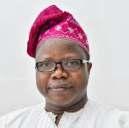
Emeka Onwuka appointed as Chief Financial Officer/Executive Director at Seplat Petroleum

Effective August 1, 2020, Emeka Onwuka became the Chief Financial Officer and Executive and Executive Director of Seplat Development Company Plc. The announcement was made by the Board of Directors
Onwuka has over 30 years' experience in financial services within sub-Saharan Africa. He was the former Group Managing Director /CEO of Diamond Bank Plc and former Chairman of Enterprise Bank Limited. He is a Partner at Andersen Tax Nigeria and holds various Board positions as Chairman; FMDQ Securities Exchange Limited; Director FMDQ Holdings Limited; Director, Ecobank Nigeria Limited; and Director, Bharti Airtel Nigeria.
He received his BSc. in Political Science from the University of Nigeria, Nsukka and holds an MBA from the University of Benin. He is a Chartered Accountant, a Fellow of the Institute of Chartered Accountants of Nigeria, a Fellow of Chartered Institute of Taxation of Nigeria. He has attended executive programs at Wharton Business School and Harvard Business School. He is an alumnus of the Senior Management Programme (SMP 7) of Lagos Business School. Onwuka holds the Nigerian National Honour, Officer of the Order of the Niger (OON).
Olabode Adetoyi appointed as Commissioner, Agriculture & Food Safety, Ekiti State

Dr Olabode Adetoyi has been appointed as the Ekiti State Commissioner for Agriculture and Food Safety. The new commissioner was sworn into office on August 21, 2020.
Dr Adetoyi is a renowned agriculturist, and the Founder & Country CEO of HiNutrients International Ltd , an international manufacturer and distributor of vitamins and mineral premixes to livestock industries. He is a registered Animal Scientist of the Nigeria Institute of Animal Science; Chairman, South-West Zone and National Vice President of Poultry Association of Nigeria; Vice President of Association of Feeds Producers in Nigeria and Vice Chairman of Nigerian Feeds Association.
He is a Fellow of the Fisheries Society of Nigeria, Institute of Agribusiness Management of Nigeria, Postgraduate College of Animal Science in Nigeria and the Institute of Corporate Governance of Nigeria. A recipient of many awards, including the Captain of Industry award by Nigeria Society of Animal Production & Babcock University, Dr Adetoyi also received an Honorary Doctorate degree in Business Management and Entrepreneurship by American-European University.
Dr Adetoyi obtained a Bachelor's degree in Agriculture with specialisation in Animal Production from the University of Ilorin and a Master's degree in Animal Science from the University of Ibadan. He also has a Master's in Business Administration (MBA) from Lagos State University. He has undergone executive training at Harvard Business School and Pan Atlantic University (Grooming Enterprise Leader, GEL). He is an alumnus of the Senior Management Programme (SMP 19) of Lagos Business School.
AMP 12
Tunde Ekpekurede has published a book “Realizing Mental Resilience: Unleashing Individual & Team Potentials”. With executive experience in Nigeria, Ireland and England, Ekpekurede is an authority in the field of mental toughness and resilience and has served as a speaker, facilitator and executive coach in this field He is currently the CEO of Learning4Living, a training & development company. The book is available on Audible and Amazon Kindle. It can also be ordered by emailing support@learning4living.biz

AMP 21
Paul Ikechukwu Onyia has released his first published novel, Nightfall in the Twilight. The novel is a fictional exploration of the psychological and emotional impact of the Outcast System on those affected. The book can be purchased via Amazon website. Chief Onyia spent over 30 years as a journalism & marketing communication professional. He currently facilitates management training and is the regent of the ancient kingdom of Obinagu in Udi Local Government of Enugu State, Nigeria. He is also the President of the AMP 21 Class.

EMBA 22

To commemorate Menstrual Hygiene Day, the Executive Master of Business Administration (EMBA) 22, in partnership with PadUp Africa, organised a hygiene and sensitisations support project in poor communities & villages outside Abuja. Disposable pads, reusable face masks, sanitisers, among other materials, were distributed to the young women. The President of the class is Efosa Aigbe.
Sylvester Ekpen was inducted as a Fellow into the Chartered Institute of Taxation of Nigeria in a conferment ceremony on October 10, 2020. After spending 22 years in the Financial Services and Oil & Gas sectors, Ekpen is currently the MD/CEO of Henster, an e-commerce company focused on gymwear and other outfits for men and women.

The Management Acceleration Programme (MAP) 7 class provided relief materials to Friends of the Disabled (FOTD) Vocational Centre in Lagos Island in October. The President of the class is Shweta Srivastava.

SMP 21
With over 30 years spent in Retail, Commercial, and Operations business units of Commercial and Merchant Banking, Joseph Okunato shares his wealth of experience in his new book, International Trade & Finance. The book was written to serve as a reference book for bankers, consultants, advisers and members of the academia and businessmen; and to assist candidates preparing for the examinations of The Chartered Institute of Bankers of Nigeria (CIBN). The book can be p u r c h a s e d v i a t h e b o o k ' s o f f i c i a l w e b s i t e a t https://www.itradeandfinance.com or via Amazon, Balboa and Barnes & Noble websites.

SMP 58
Adejuwon Otelaja has been appointed as Chairman of the Pharmaceutical Society of Nigeria in Kwara State. He is also the Chairman of the Association of Community Pharmacists of Nigeria and a volunteer with Ambassadors Medical Missions. Otelaja is the CEO of Kanymed Healthcare, Illorin.


LBSAA EXCO MEETINGS: Wed Feb 10, Wed April 7, Wed June 9, Wed October 6
GOVERNING COUNCIL MEETINGS: Sat Feb 6, Sat May 8 and Sat Nov 9
Executive Programme Graduation: Saturday, November 27, 2021
Convocation Ceremony: Saturday, December 4, 2021




